When you need to quench your thirst, not just any drink will do. Even though some drinks, particularly juices and teas, might sound refreshing and even healthy, don’t be fooled. See, they are often loaded with sugars and preservatives and really aren’t good for you, at all. Yes, they are simply unhealthy drinks you might not even be aware of how bad they actually are for you.
The American Heart Association recommends limiting sugar to 25 grams daily for women and 36 grams daily for men, yet some of your favorite beverages have more than that in just one serving.
The next time you make a trip to the grocery store, be sure to avoid these 50 unhealthy drinks, all of which are some of the worst options on the market. When in doubt, it’s never a bad idea to sip on some water! And if you’re looking for the best thing to drink every day check out The #1 Best Juice to Drink Every Day, Says Science.
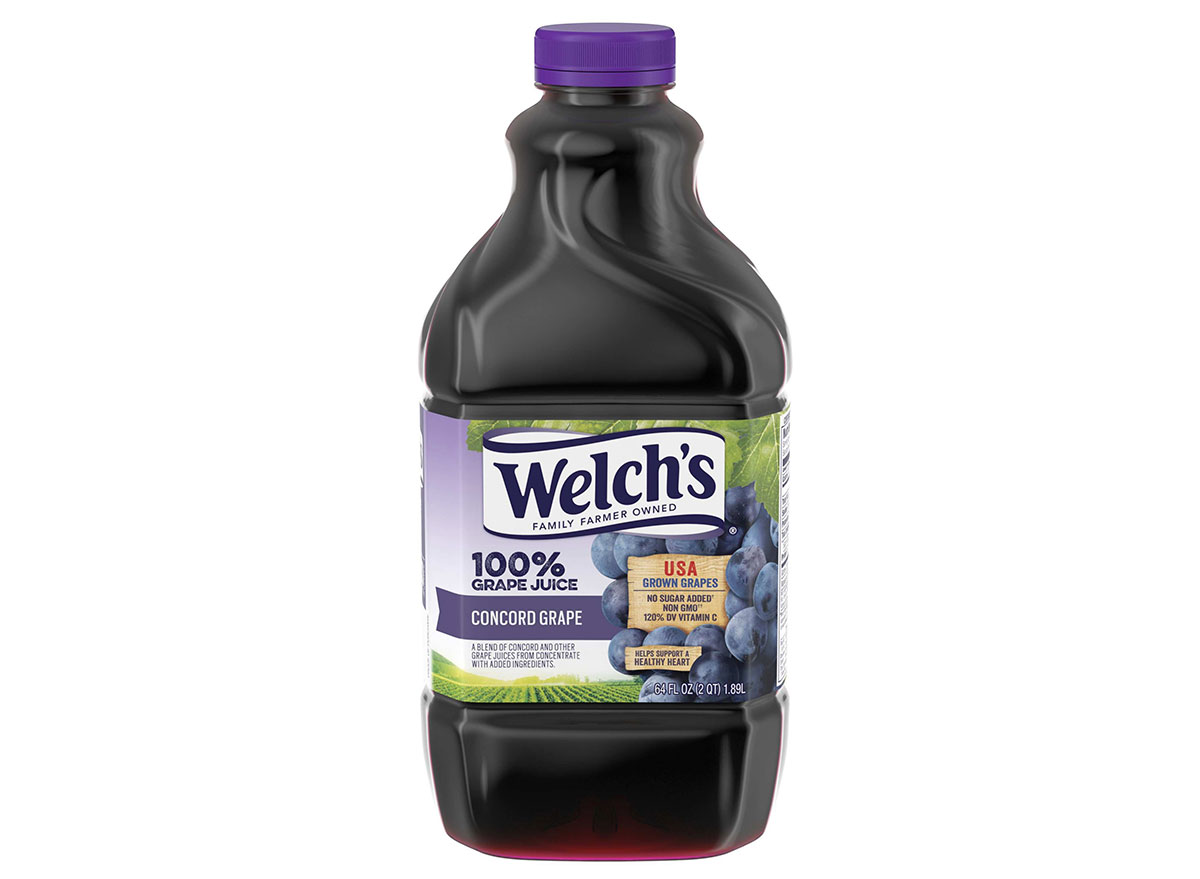

Per 1 serving: 140 calories, 0 g fat (0 g saturated fat), 15 mg sodium, 38 g carbs (3 g fiber, 36 g sugar), 1 g protein
Karen Graham, RD, CDE, says that bottled fruit juices are one of the worst beverages for individuals trying to lose weight, noting that the word “unsweetened” throws people off. “Beware, ‘unsweetened’ means no sugar added but it does not mean sugar-free,” Graham says. “When fruit is blended up or squeezed out of a fruit, what you are left with is the fruit sugar but virtually none of the good whole fiber.”
Grape juice is a lunch box staple, and although it does have some fiber and even a bit of protein, Welch’s iconic grape juice is loaded with sugars. There are no added sugars which is an upside, but even so, 36 grams of sugar in just 8 ounces is definitely excessive. Enjoy as a treat or even mix a smaller amount of grape juice with plain or sparkling water.
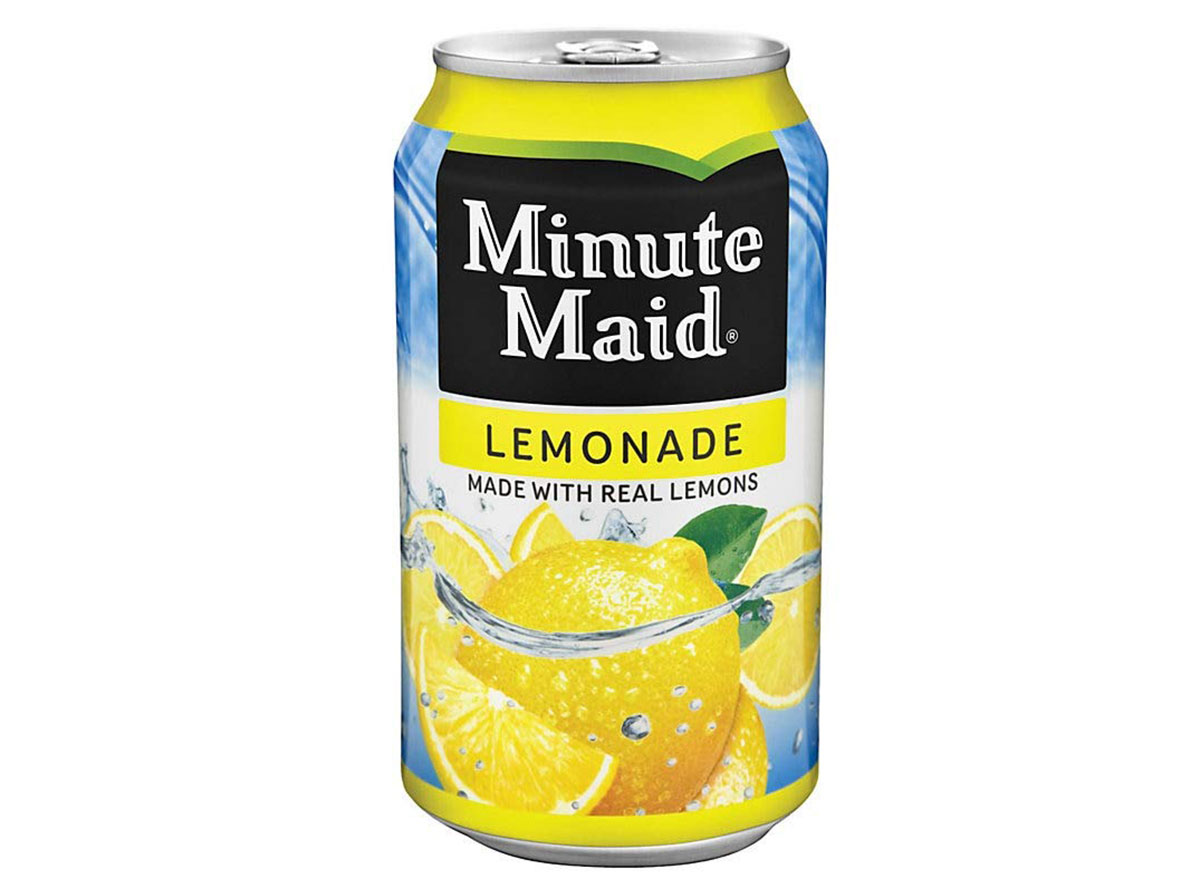

Per 1 serving: 150 calories, 0 g fat (0 g saturated fat), 50 mg sodium, 42 g carbs (0 g fiber, 40 g sugar), 0 g protein
Is there anything more refreshing than lemonade on a hot summer day? Well, yes there is—water! And you should definitely opt for water over Minute Maid Lemonade, as one can of this is loaded with 40 grams of added sugars. If you want lemonade, make your own instead to control the amount of sugar going into it. (And just so you know, this 7-day smoothie diet will help you shed those last few pounds!)
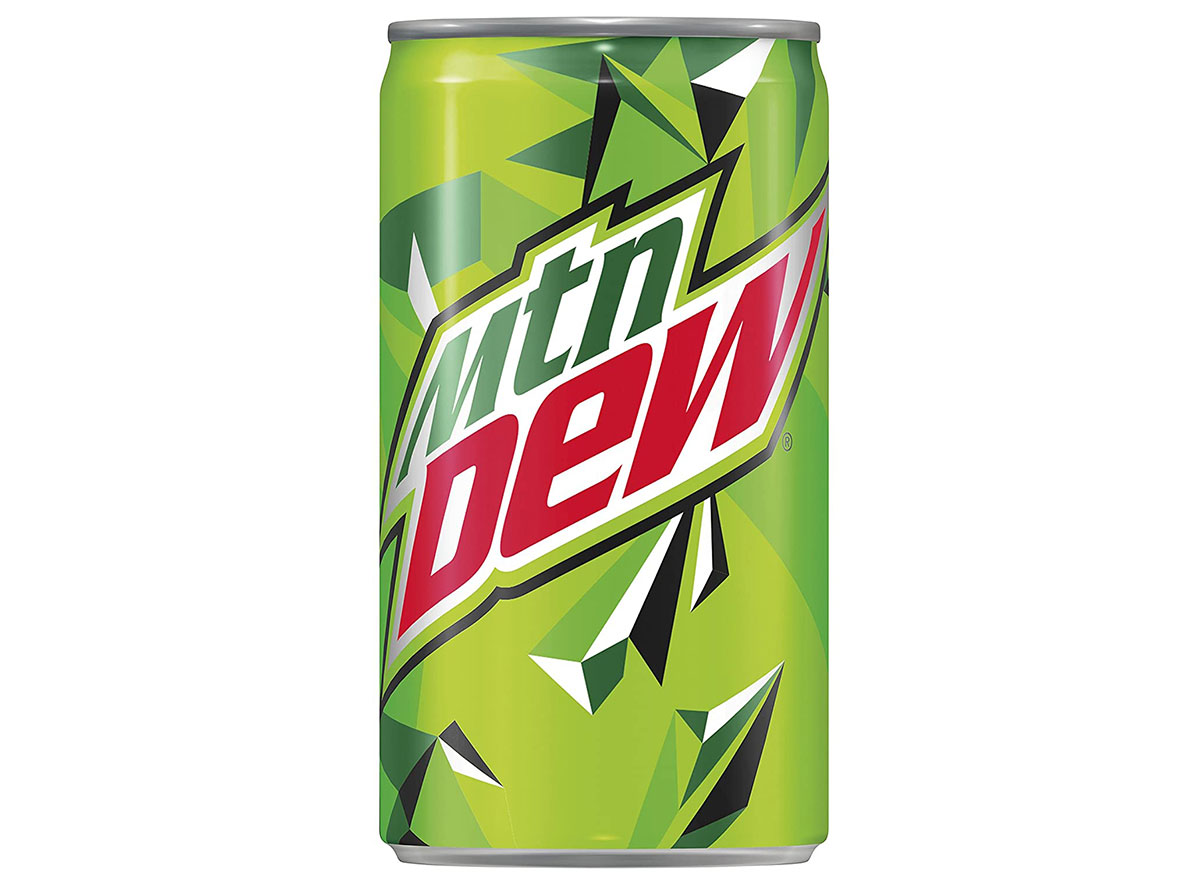

Per 1 can: 170 calories, 0 g fat (0 g saturated fat), 60 mg sodium, 46 g carbs (0 g fiber, 46 g sugar), 0 g protein
Obviously Mountain Dew isn’t touted as a healthy beverage, but we’d recommend steering clear of it even for a treat. There are plenty of other sweet beverages to enjoy that don’t have nearly 50 grams of sugar per serving—one can of Mountain Dew has almost twice the daily recommended amount of sugar!
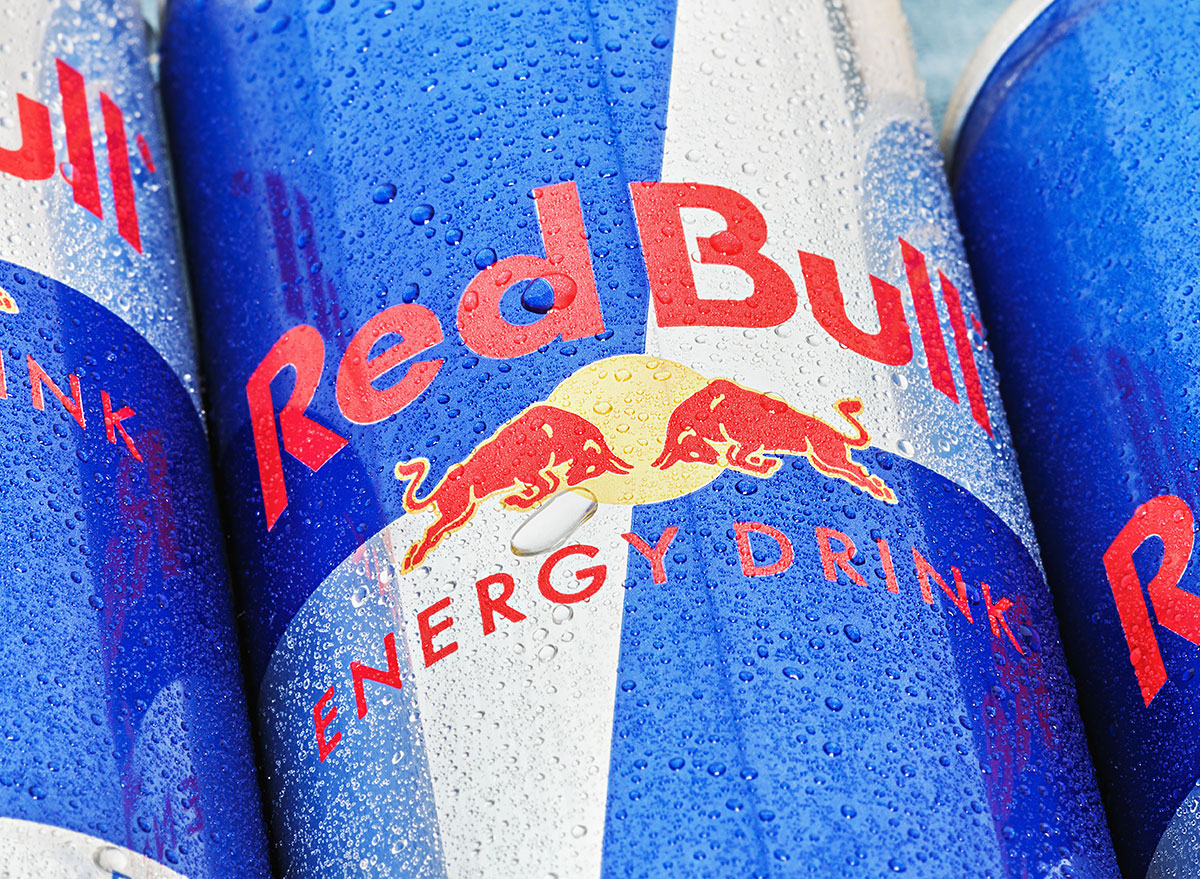

Per 1 can: 110 calories, 0 g fat (0 g saturated fat), 105 mg sodium, 29 g carbs (0 g fiber, 27 g sugar), 0 g protein
It’s no secret that Red Bull isn’t great for your health. With 27 grams of sugar, it will leave you crashing not long after drinking it. According to a study by WHO, full the most concerning issue is the amount of caffeine, which “can cause palpitations, hypertension, dieresis, central nervous system stimulation, nausea, vomiting, marked hypocalcemia, metabolic acidosis, convulsions, and, in rare cases, even death.”
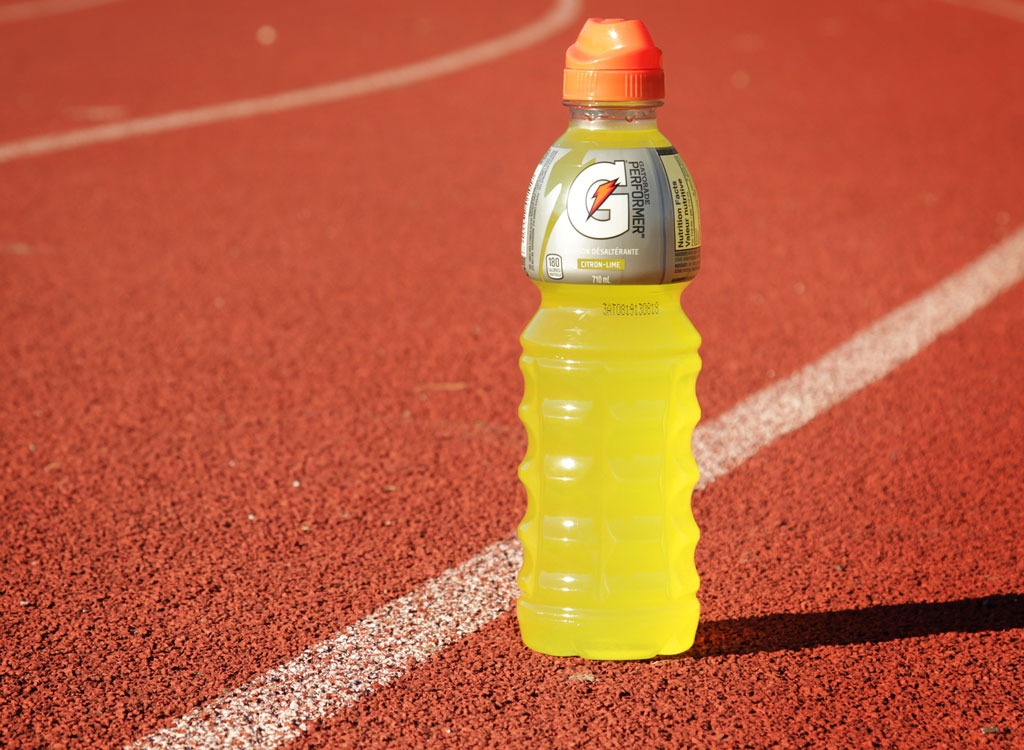

Per 1 bottle: 140 calories, 0 g fat (0 g saturated fat), 270 mg sodium, 36 g carbs (0 g fiber, 34 g sugar), 0 g protein
Vanessa Rissetto MS, RD, CDN, co-founder of Culina Health, says that although Gatorade serves a purpose for hydration, it also has a fair amount of sugar. And for athletes, more sugar equals more cramping. “[I often] hear of marathon runners who say they have a lot of GI distress when they start running and it’s exacerbated when they drink [Gatorade],” she says. Rissetto adds that the zero-calorie versions aren’t ideal either because they contain artificial sweeteners.
More sugar than an energy drink? No, thank you! Marketed as a sports drink, Gatorade has 34 grams of sugar in a bottle. Cut the portion way down, or rehydrate with water and refuel with whole fruits and vegetables.
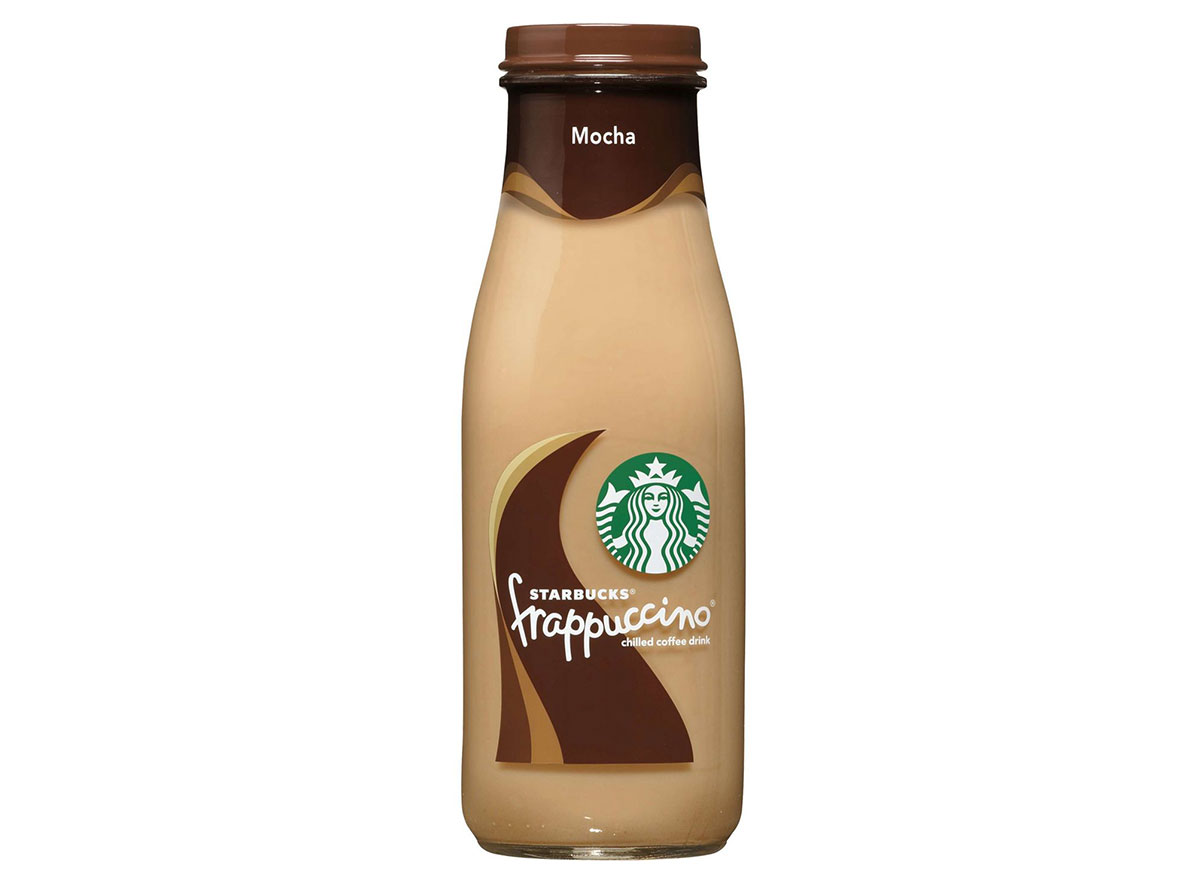

Per 1 bottle: 200 calories, 3 g fat (2 g saturated fat), 100 mg sodium, 37 g carbs (0 g fiber, 31 g sugar), 6 g protein
Sure, you can save some time in the morning by grabbing a bottle of Starbucks’ Frappuccino from the fridge, but you’ll also be consuming a lot of calories, fat, and sugar for a 9.5-ounce beverage. You’ll be thankful to spend a few extra minutes making your own coffee.
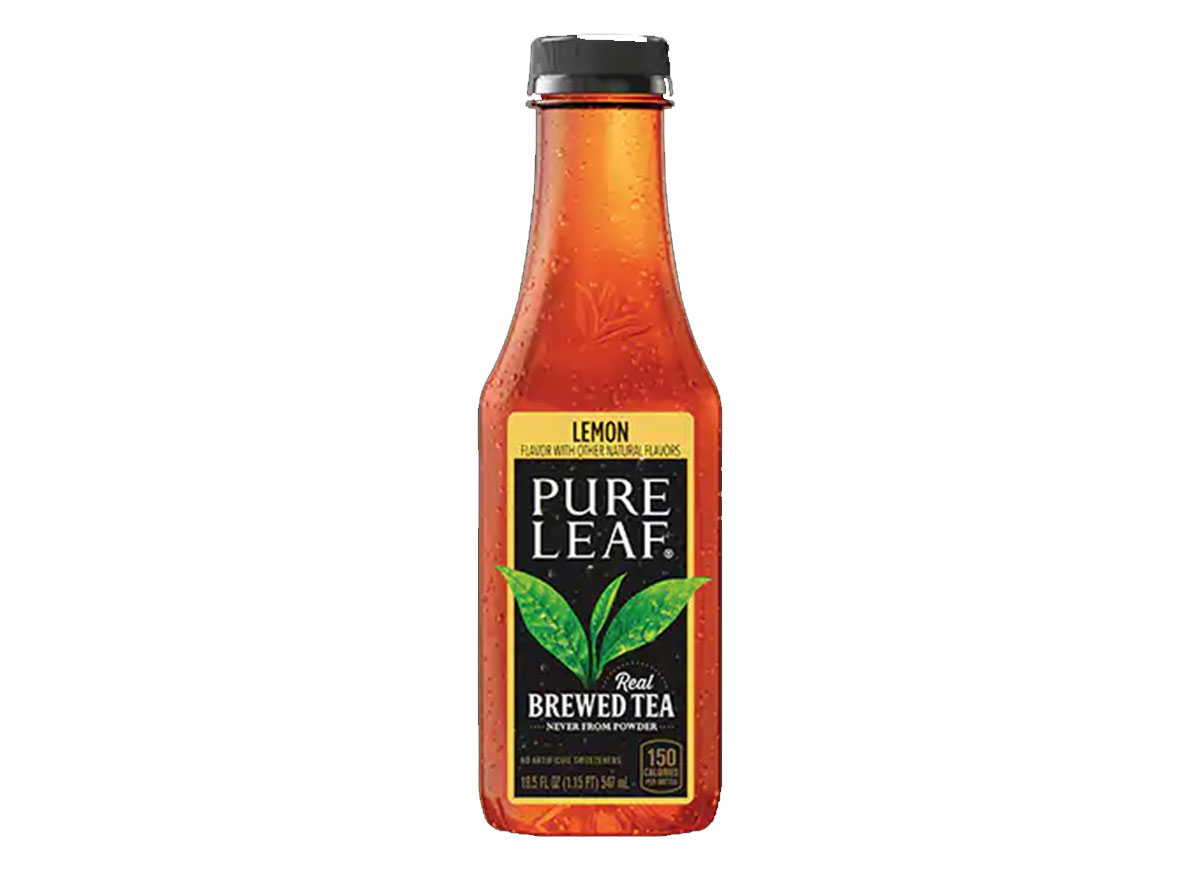

Per 1 bottle: 160 calories, 0 g fat (0 g saturated fat), 0 mg sodium, 42 g carbs (0 g fiber, 42 g sugar), 0 g protein
Consider us pretty shocked to find that Pure Leaf’s popular sweet tea, a staple often bought right during checkout at the grocery store, has more sugar than drinks like Frappuccinos and Red Bull. Yikes.
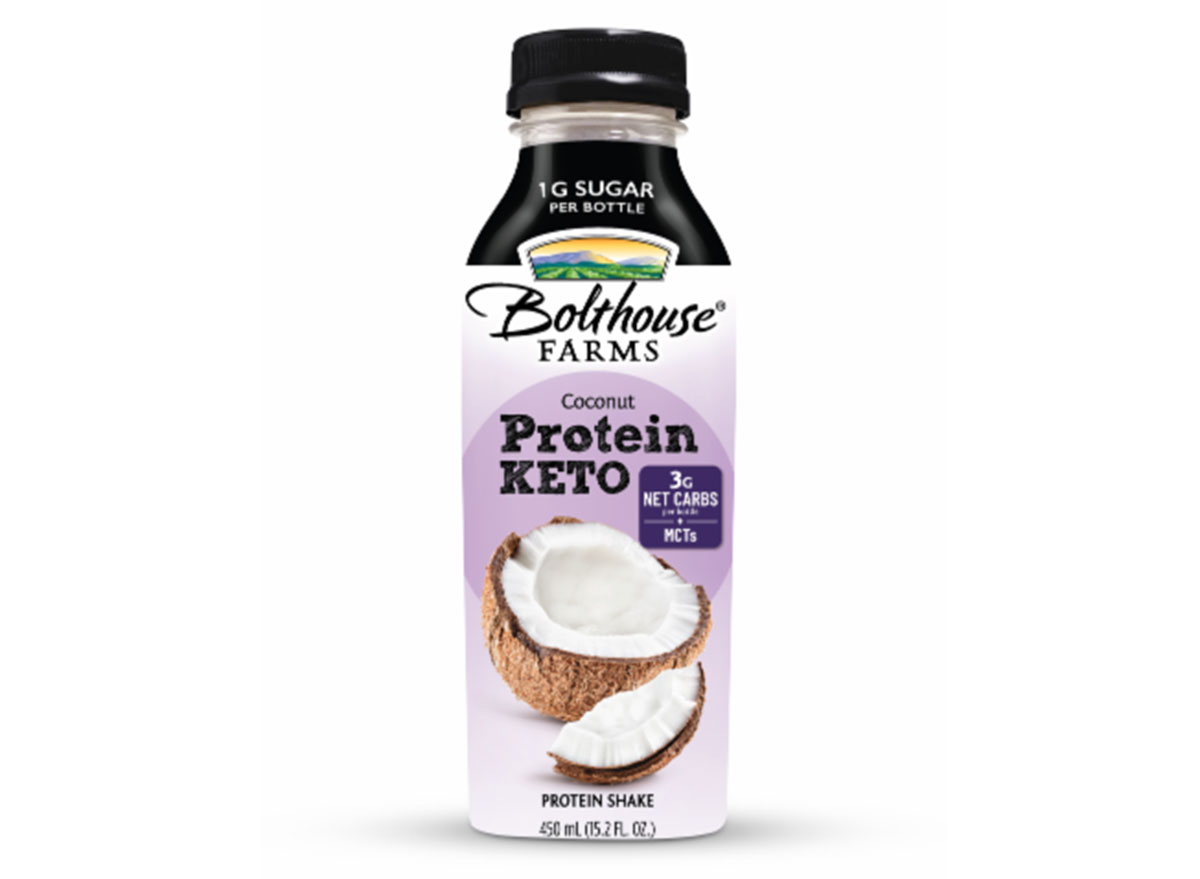

Per 1 bottle: 280 calories, 22 g fat (9 g saturated fat), 135 mg sodium, 14 g carbs (0 g fiber, 1 g sugar), 15 g protein
This bottled smoothie has all of the buzzwords: protein, keto, coconut. But don’t be deceived—this drink is high in fat. The Cleveland Clinic recommends consuming 20% to 35% of your daily calories in fat, or about 44 to 77 grams. This drink alone is about one-half to one-third of the limit.
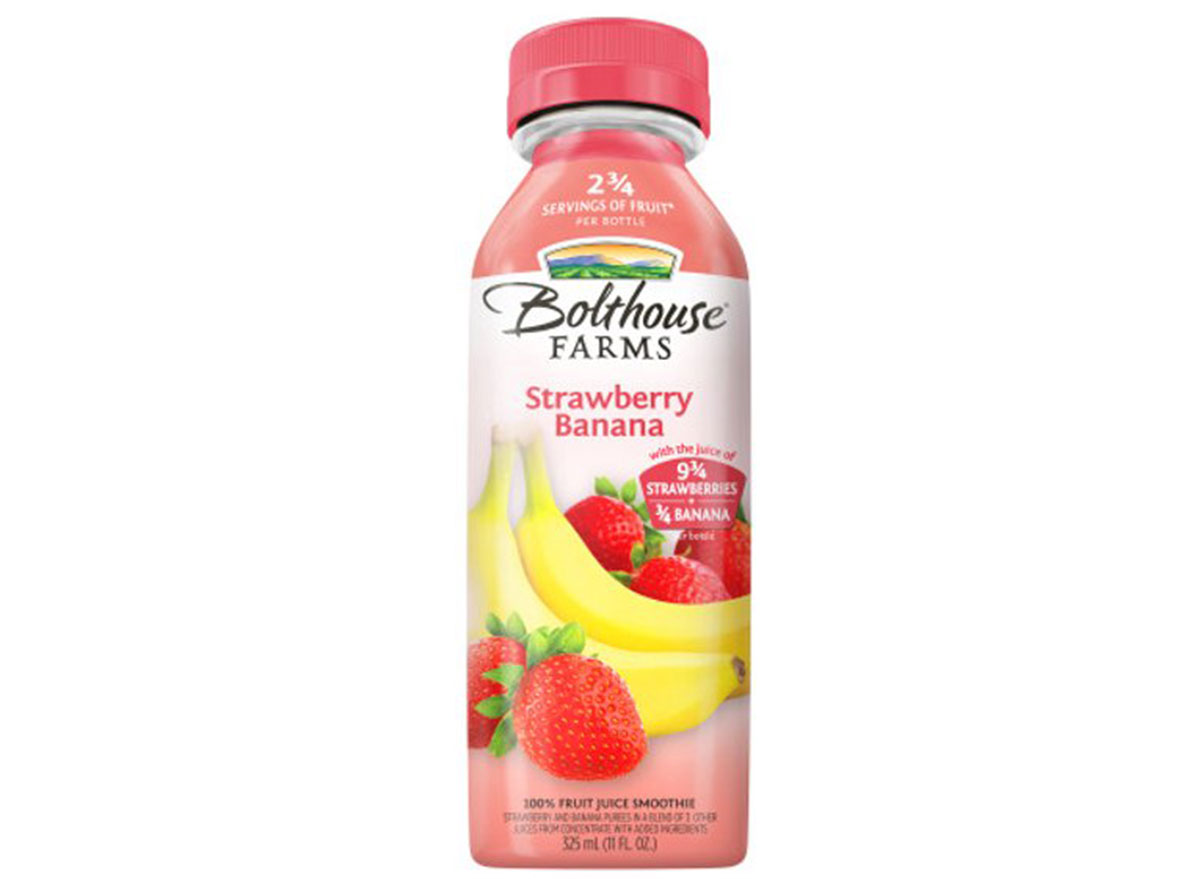

Per 1 bottle: 250 calories, 0.5 g fat (0 g saturated fat), 25 mg sodium, 61 g carbs (5 g fiber, 52 g sugar), 1 g protein
While the Protein Keto Coconut is high in fat, Bolthouse Farms’ Strawberry Banana Smoothie, which sounds like a health haven, has way more sugar than you should consume in a day. If you really want a smoothie, make your own and sneak in some veggies!
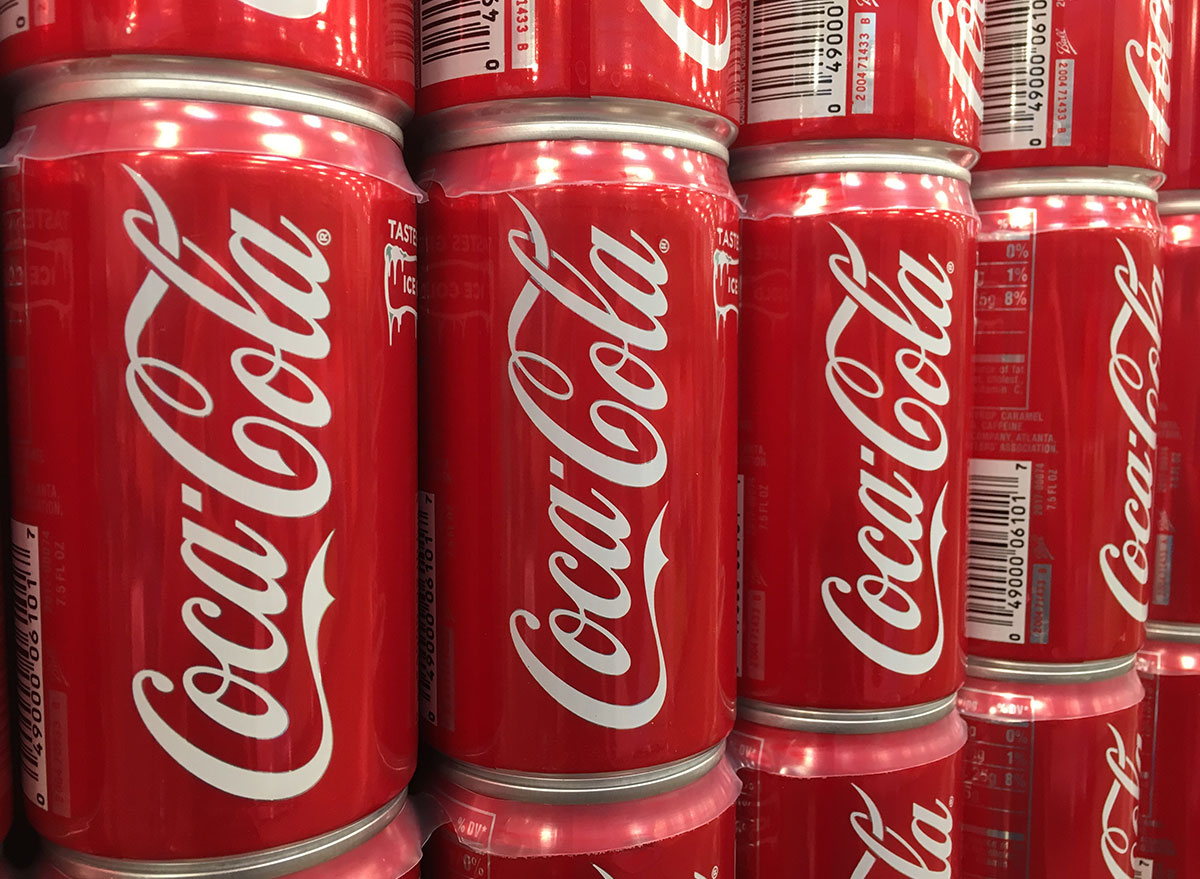

Per 1 can: 140 calories, 0 g fat (0 g saturated fat), 45 mg sodium, 39 g carbs (0 g fiber, 39 g sugar), 0 g protein
Coca-Cola is definitely not a healthy drink, but maybe once in a while it doesn’t seem so bad, right? Well, we suggest resisting the temptation that can come with having Coke in your fridge, as you’re consuming 39 grams of sugar in just one can. Opt for flavored sparkling water instead.
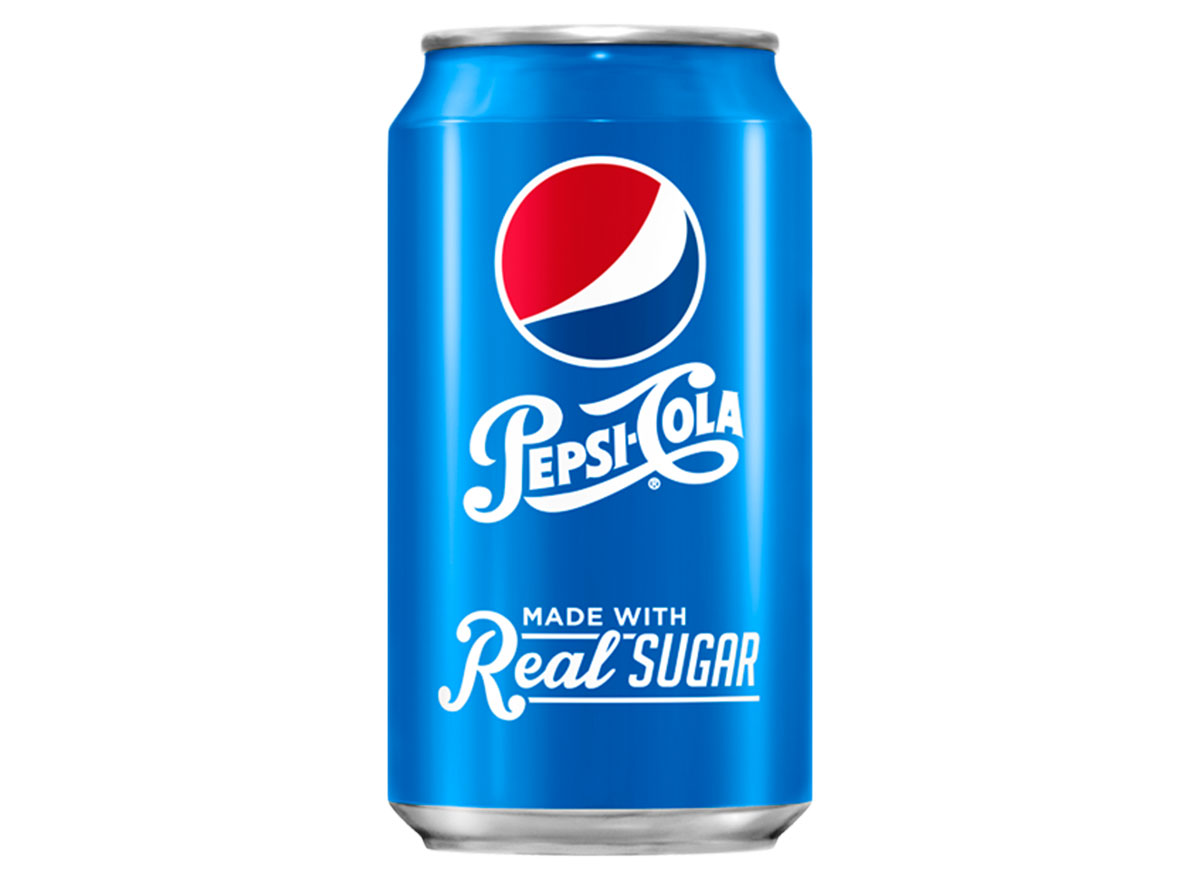

Per 1 can: 150 calories, 0 g fat (0 g saturated fat), 30 mg sodium, 41 g carbs (0 g fiber, 41 g sugar), 0 g protein
Similarly to Coca-Cola, Pepsi is also loaded with sugar—in fact, it even has more than Coca-Cola. Hard pass!
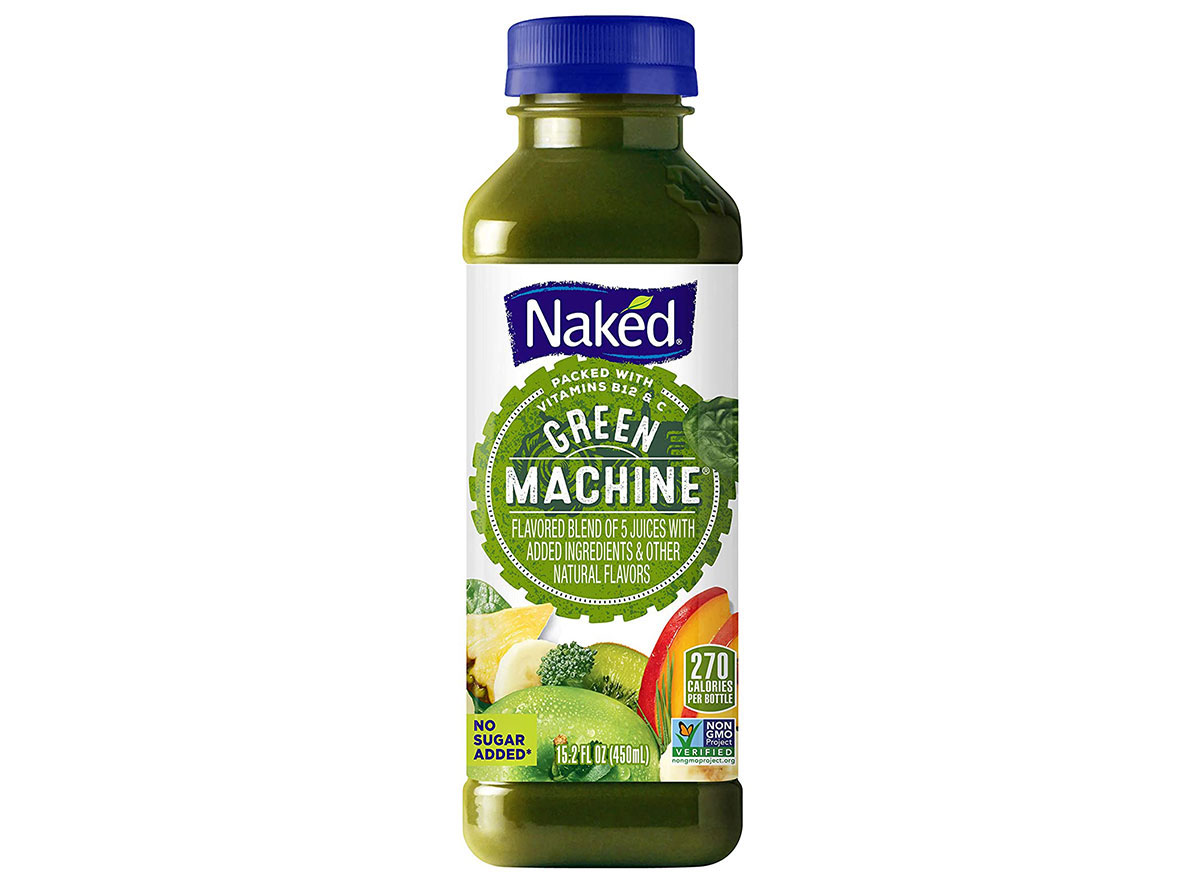

Per 1 bottle: 270 calories, 0 g fat (0 g saturated fat), 25 mg sodium, 63 g carbs (0 g fiber, 53 g sugar), 4 g protein
Oh, these bottled smoothies. They always sound refreshing, and even good for you, but they are super sneaky. This popular bottled green smoothie looks healthy, but its 53 grams of sugar say otherwise.
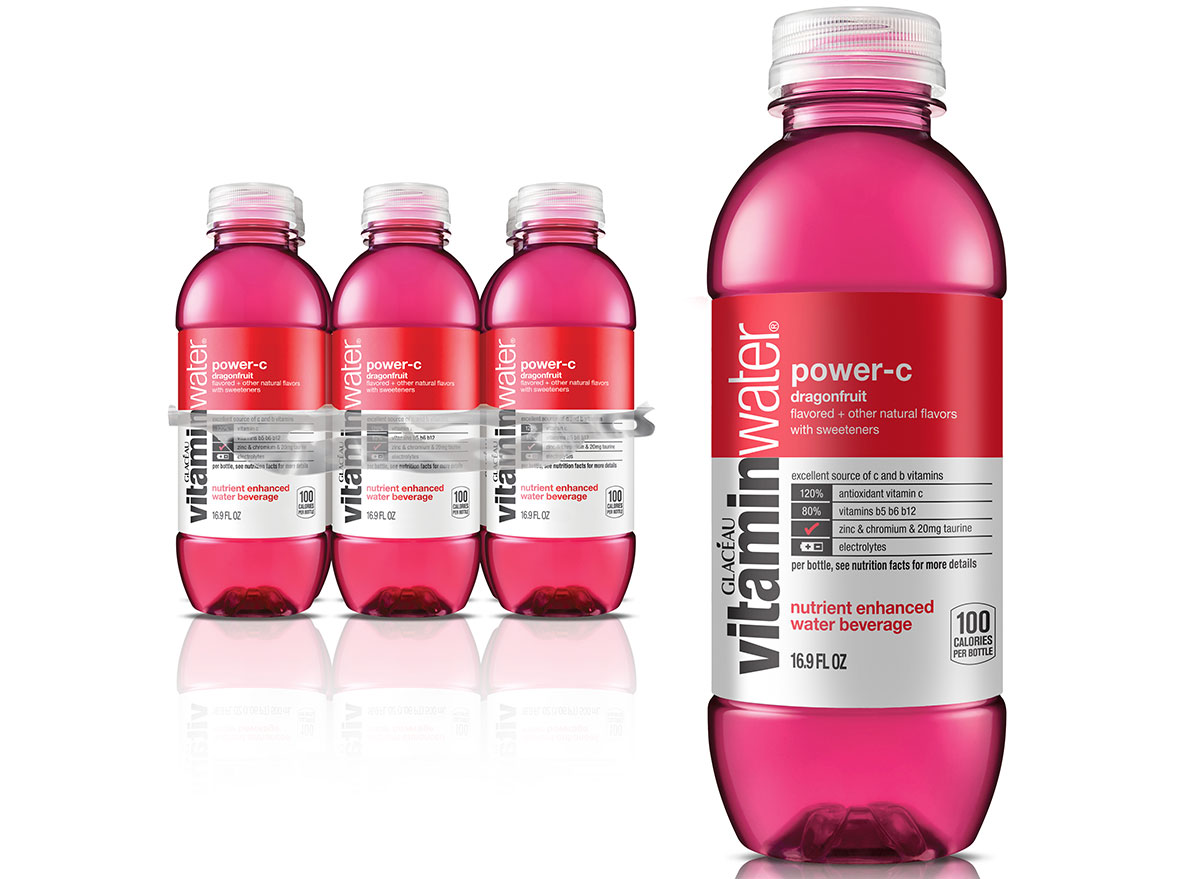

Per 1 bottle: 100 calories, 0 g fat (0 g saturated fat), 0 mg sodium, 27 g carbs (0 g fiber, 27 g sugar), 0 g protein
“Vitaminwater [is] usually perceived as healthy, but [it] can contain as much sugar as a soda,” says Kelsey Rosenbaum, MS, RD, LDN, regional dietitian for Sodexo.
Vitaminwater Power-C contains 27 grams of added sugar, which is equivalent to seven teaspoons of sugar. Rosenbaum notes that the dietary guidelines for Americans recommend limiting added sugar to no more than 12 teaspoons per day.
Vitaminwater is another deceptive beverage. It sounds like you would be sipping on water that is packed with vitamins, but it’s actually just full of sugar. Add fresh fruit to a glass of water instead.
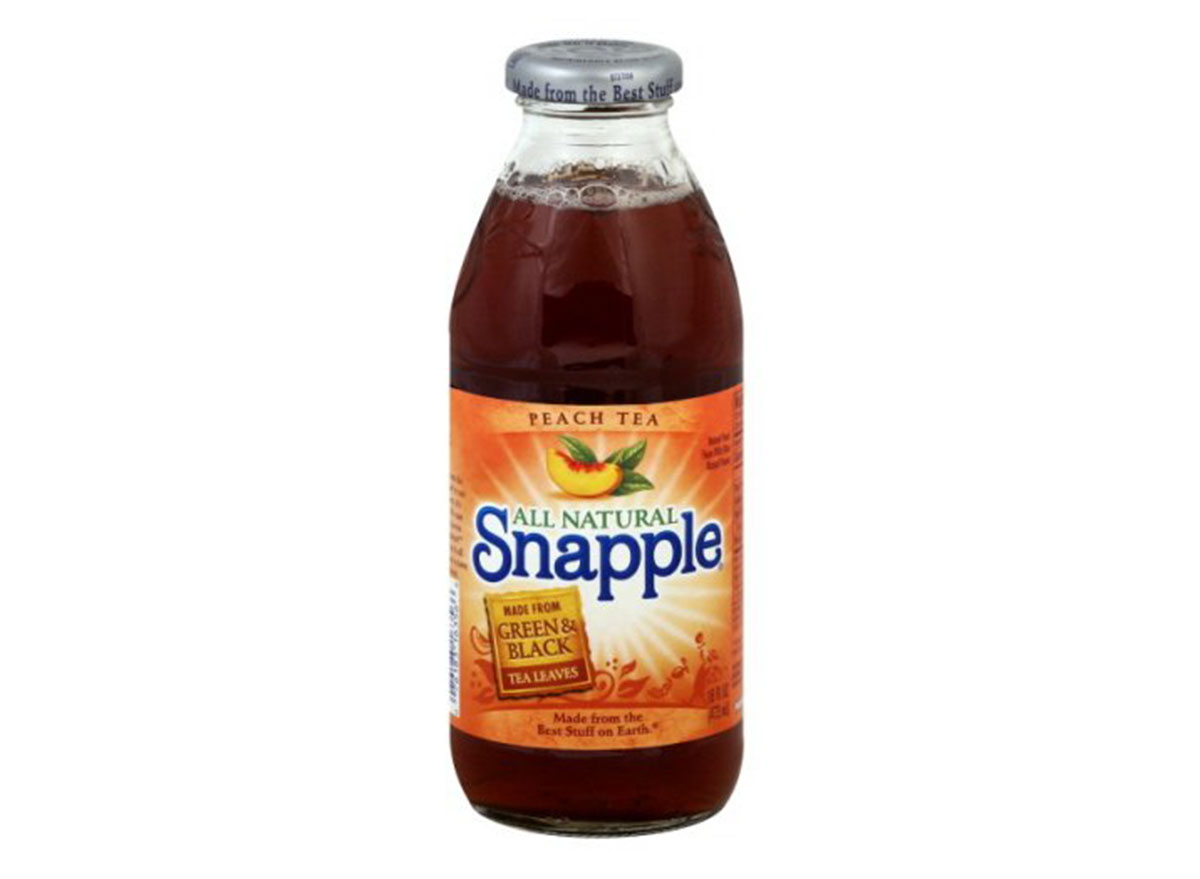

Per 1 bottle: 160 calories, 0 g fat (0 g saturated fat), 10 mg sodium, 40 g carbs (0 g fiber, 40 g sugar), 0 g protein
Snapple has been a popular drink for years. How can you not love a drink when it has 40 grams of sugar added to it?! This is another overly sweet beverage best left at the store.
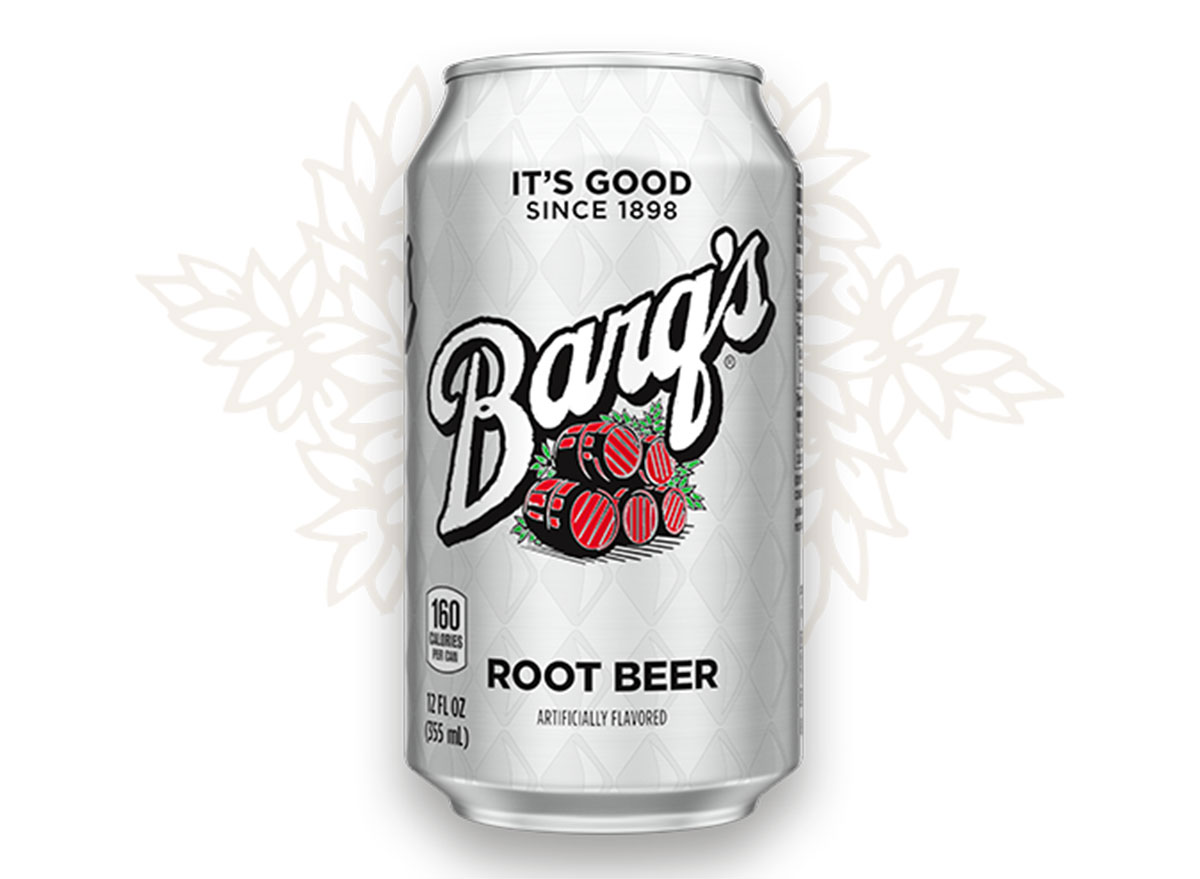

Per 1 can: 160 calories, 0 g fat (0 g saturated fat), 65 mg sodium, 44 g carbs (0 g fiber, 44 g sugar), 0 g protein
A root beer float on a hot summer day? Yum! So if you do want root beer, opt for a small amount as a special treat, because this pop is heavy-handed with the sugar, and if you’re adding ice cream to it, that amount of the sweet stuff is just going to skyrocket.
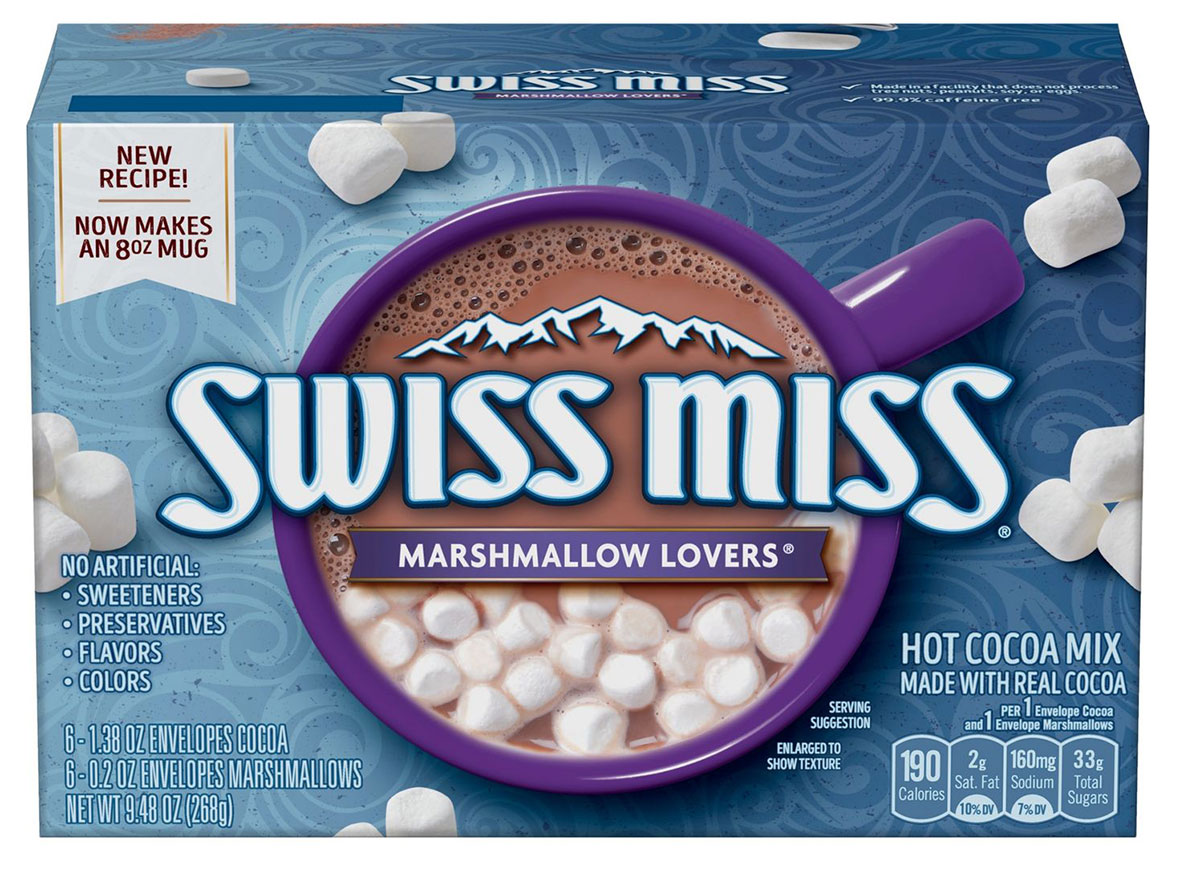

Per 1 serving: 190 calories, 2.5 g fat (2 g saturated fat), 160 mg sodium, 39 g carbs (1 g fiber, 33 g sugar), 1 g protein
On the contrary, nothing makes a chilly winter day better than a mug of hot chocolate—don’t forget the marshmallows, right? Although, with 33 grams of sugar for one cup, maybe hot tea or coffee can warm you up instead…


Per 1 serving: 90 calories, 0 g fat (0 g saturated fat), 10 mg sodium, 24 g carbs (0 g fiber, 24 g sugar), 0 g protein
In just 8 ounces of this tea-lemonade mixture, there is a whopping 24 grams of sugar. But it is typically sold in a 23-ounce can, meaning you can easily consume over 60 grams of sugar in this beverage alone. Yikes!
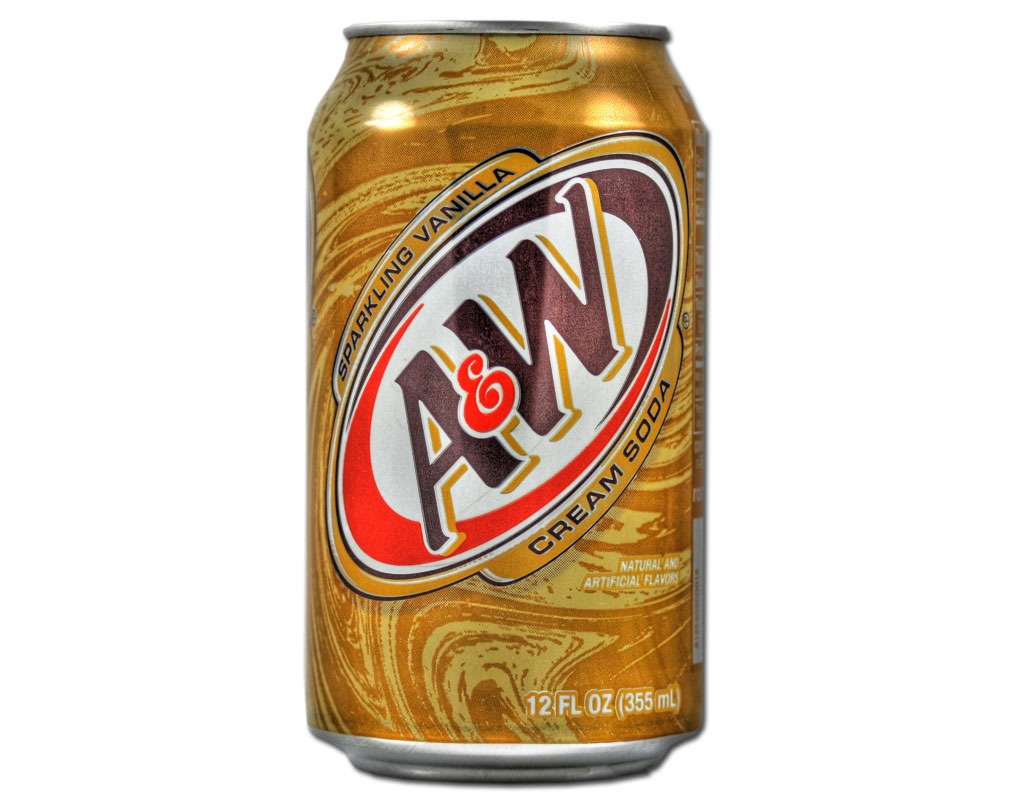

Per 1 bottle: 170 calories, 0 g fat (0 g saturated fat), 70 mg sodium, 46 g carbs (0 g fiber, 46 g sugar), 0 g protein
Like root beer, cream soda was practically made to become an ice cream float. But with 46 grams of sugar, this should also be reserved as an occasional treat due to the high sugar content.
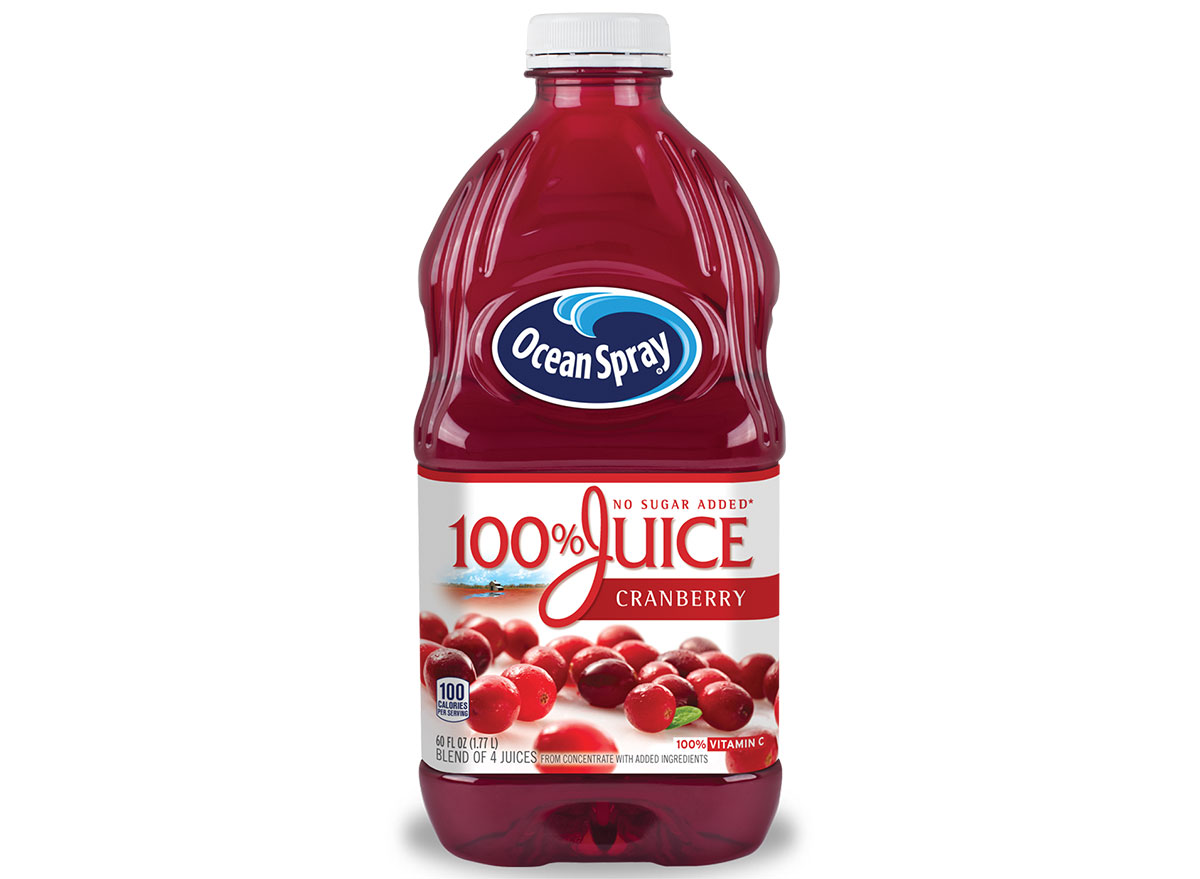

Per 1 serving: 100 calories, 0 g fat (0 g saturated fat), 25 mg sodium, 29 g carbs (0 g fiber, 23 g sugar), 0 g protein
Fruit juice is good for you, right? Unfortunately, fruit juice is high in sugars, albeit natural sugars. But compared to whole fruits, it lacks fiber, and some of the vitamins are lost when whole fruits are juiced.
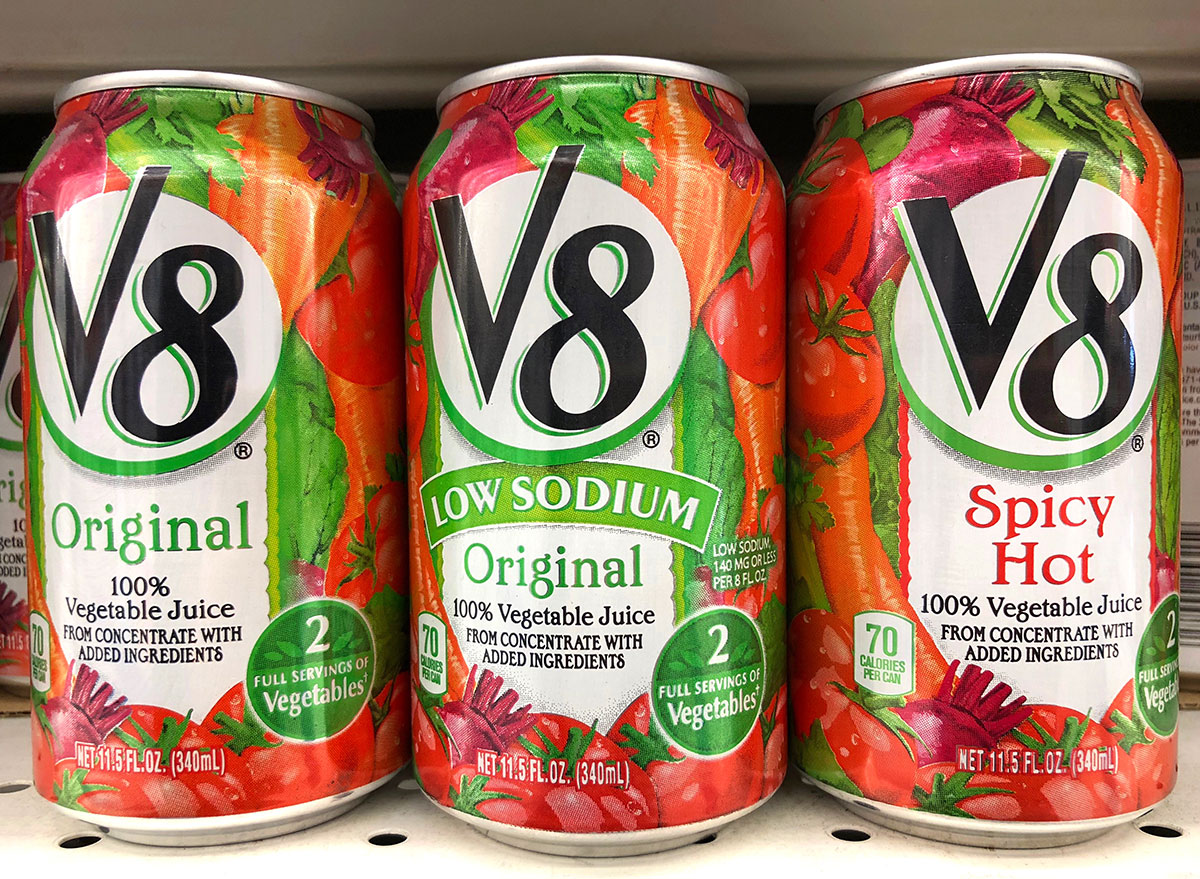

Per 1 serving: 45 calories, 0 g fat (0 g saturated fat), 640 mg sodium, 9 g carbs (1 g fiber, 7 g sugar), 2 g protein
Finally, a drink not high in sugar! …But not so fast. Unfortunately, this vegetable juice is high in sodium. The American Heart Association recommends limiting sodium content to 1,500 milligrams daily, and this drink has nearly half of that in just 8 ounces.
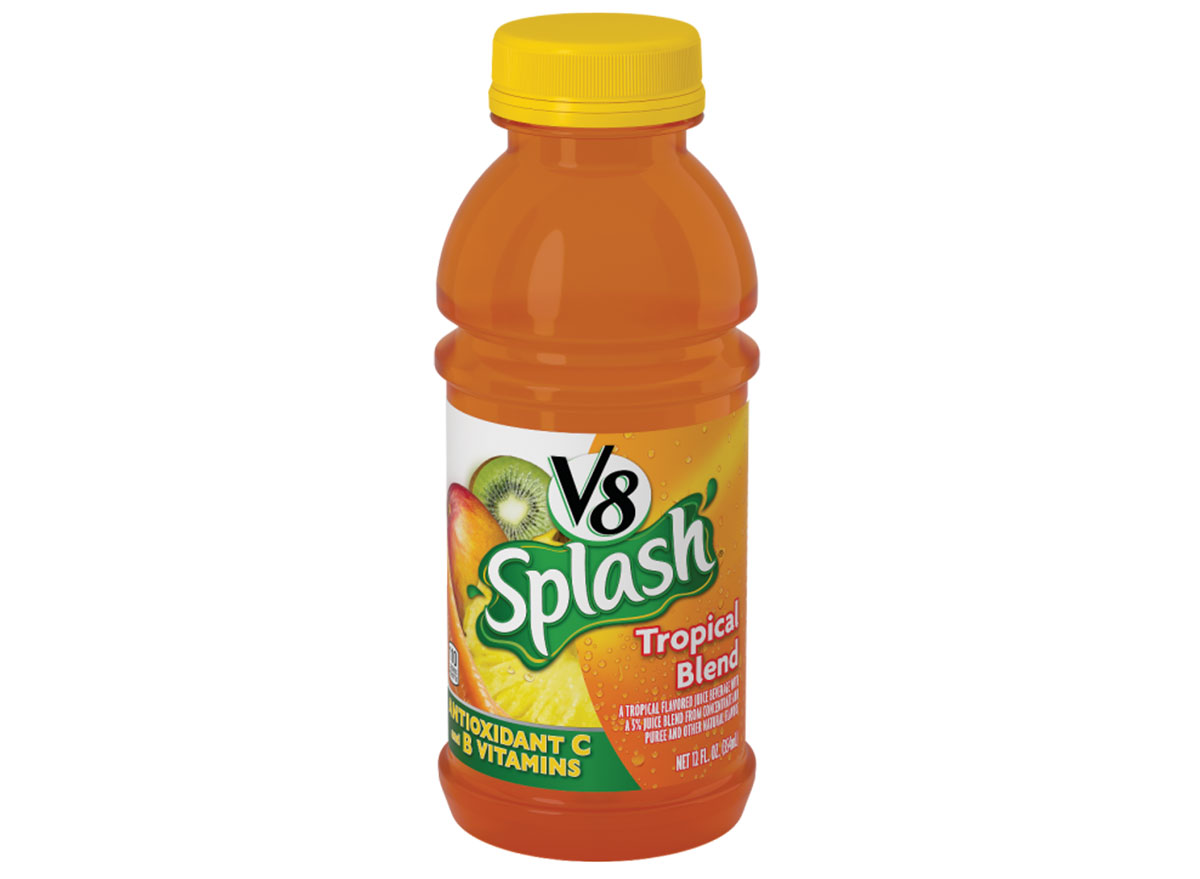

Per 1 bottle: 110 calories, 0 g fat (0 g saturated fat), 20 mg sodium, 27 g carbs (0 g fiber, 25 g sugar), 0 g protein
Meanwhile, V8 also has several popular lines of fruit beverages, like the V8 Splash. It is low in sodium, unlike the brand’s vegetable juice, but it’s packing in the sugar, especially because 24 out of the 25 grams are added sugars here.
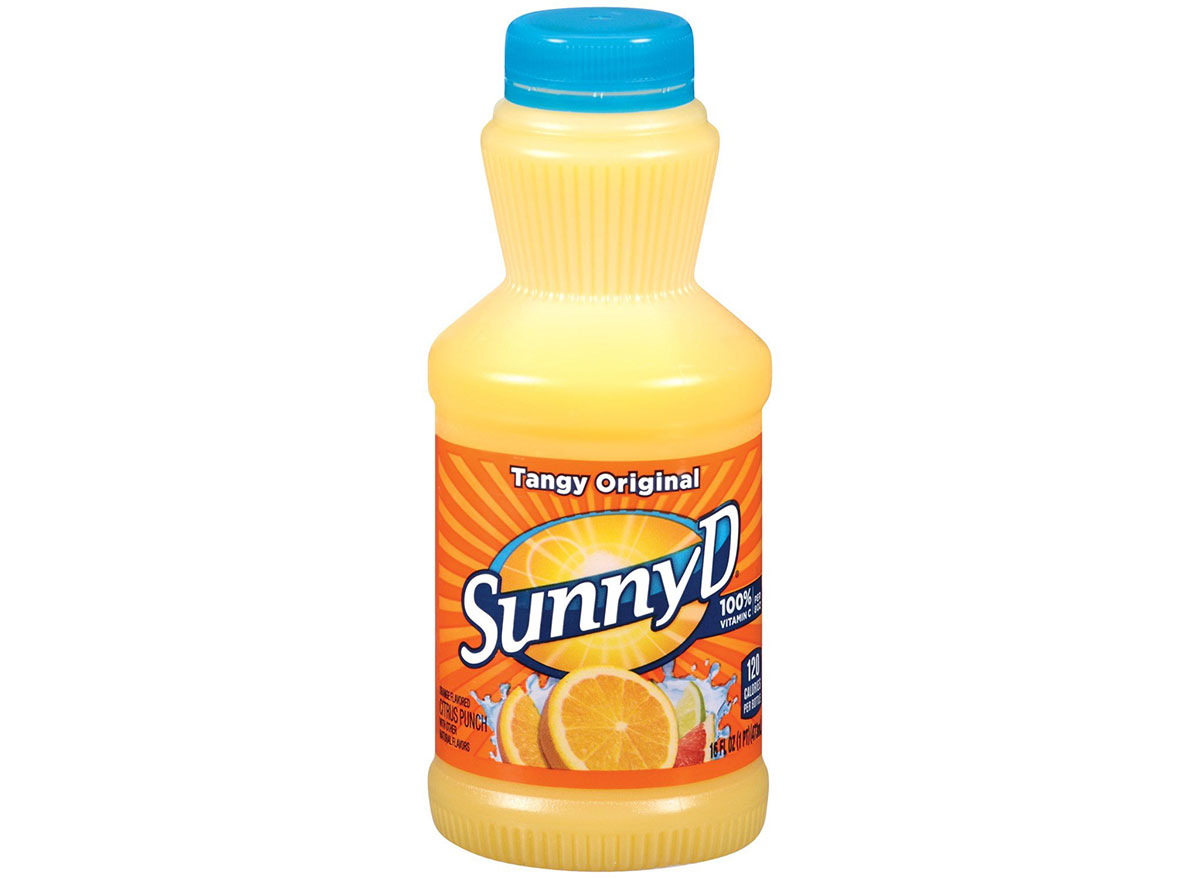

Per 1 serving: 60 calories, 0 g fat (0 g saturated fat), 190 mg sodium, 16 g carbs (0 g fiber, 14 g sugar), 0 g protein
Don’t confuse Sunny Delight with orange juice. While whole oranges are still better than orange juice, fresh-squeezed OJ is much healthier than Sunny Delight. Sunny Delight is technically a “tangy orange drink.” On 100% orange juice labels, you’ll typically see ingredients like orange juice concentrate and ascorbic acid. But the first two ingredients of Sunny Delight are water and high fructose corn syrup. If you want orange juice, drink the real deal.
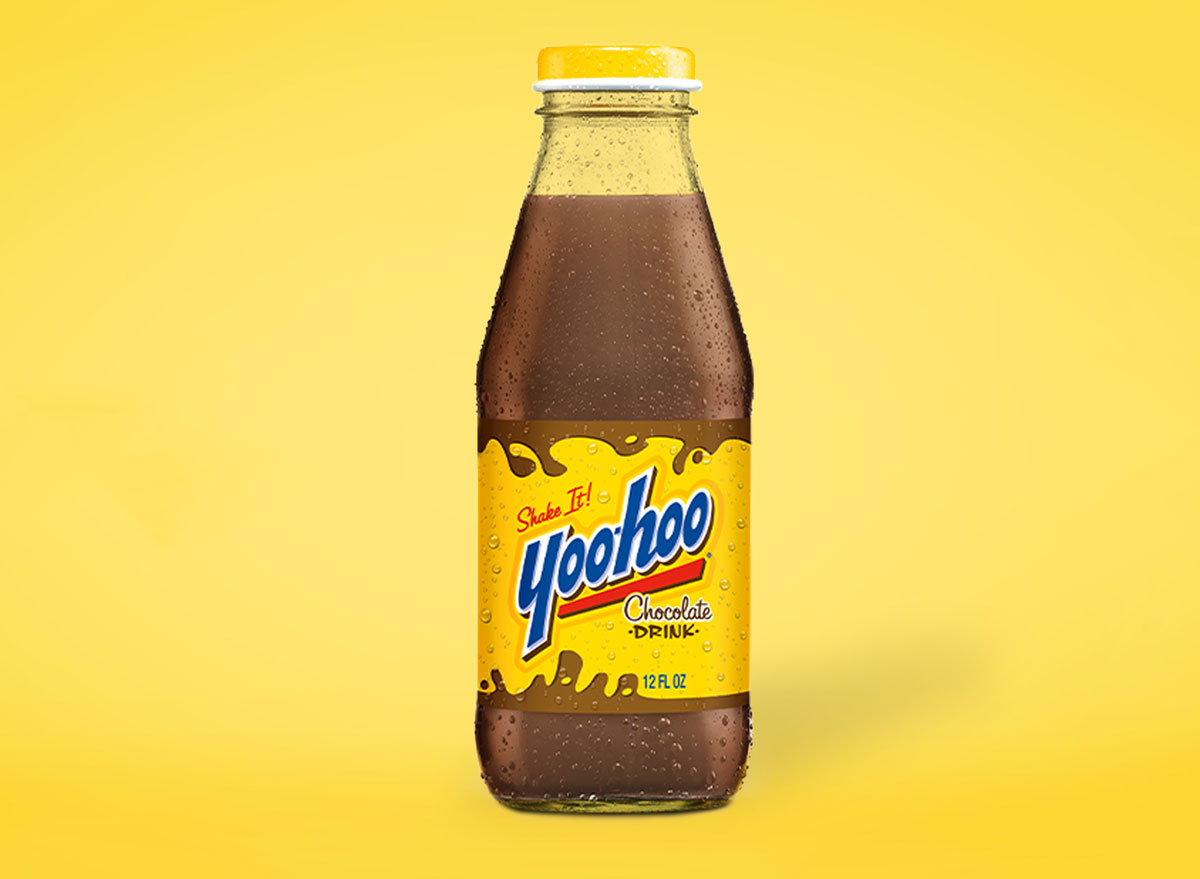

Per 1 bottle: 220 calories, 2 g fat (1 g saturated fat), 330 mg sodium, 51 g carbs (0 g fiber, 47 g sugar), 3 g protein
Yoo-Hoo has been popular for decades, but this drink has far too much sugar for anyone to consume in one day. The top two ingredients? Water and high fructose corn syrup. Definitely not a healthy version of chocolate milk.
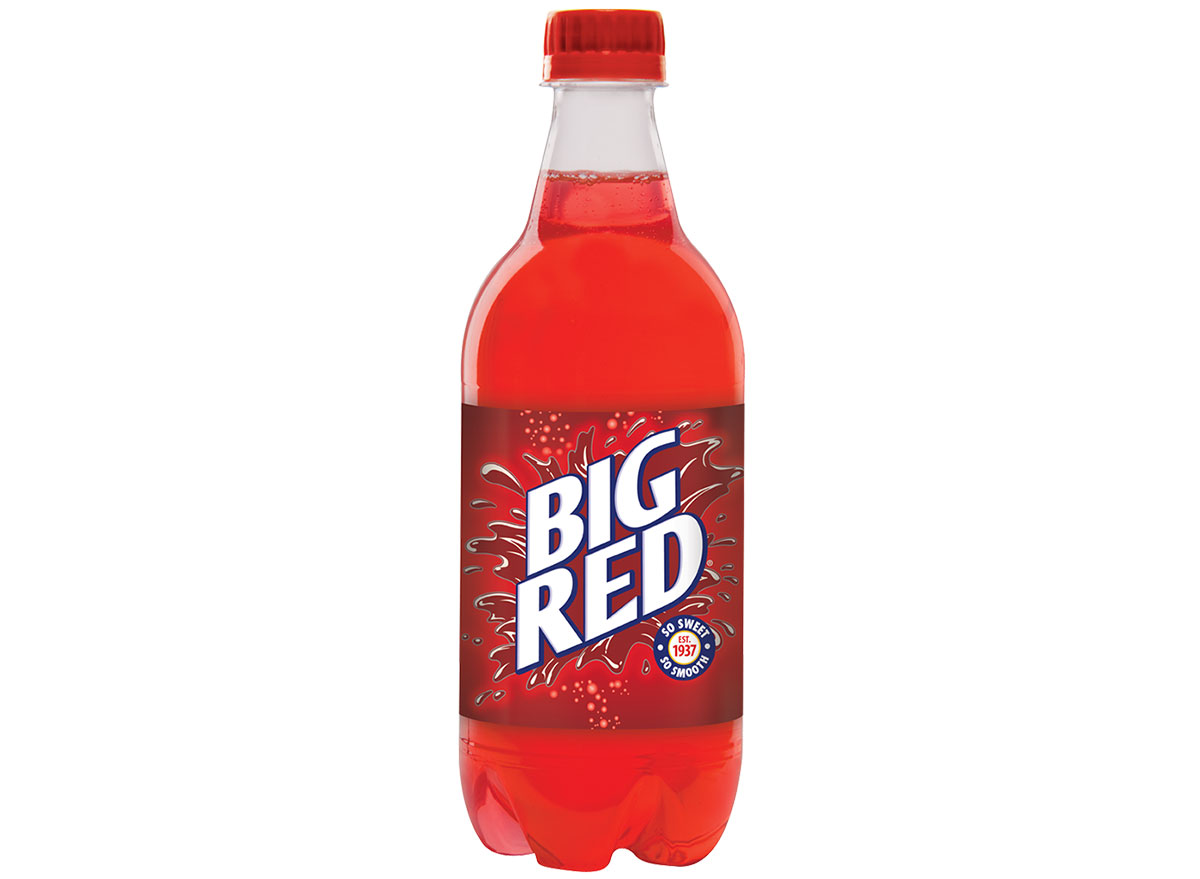

Per 1 bottle: 250 calories, 0 g fat (0 g saturated fat), 50 mg sodium, 63 g carbs (0 g fiber, 63 g sugar), 0 g protein
Big Red is a delicious red cream soda, but at what cost? A bottle has over 70 grams of sugar!
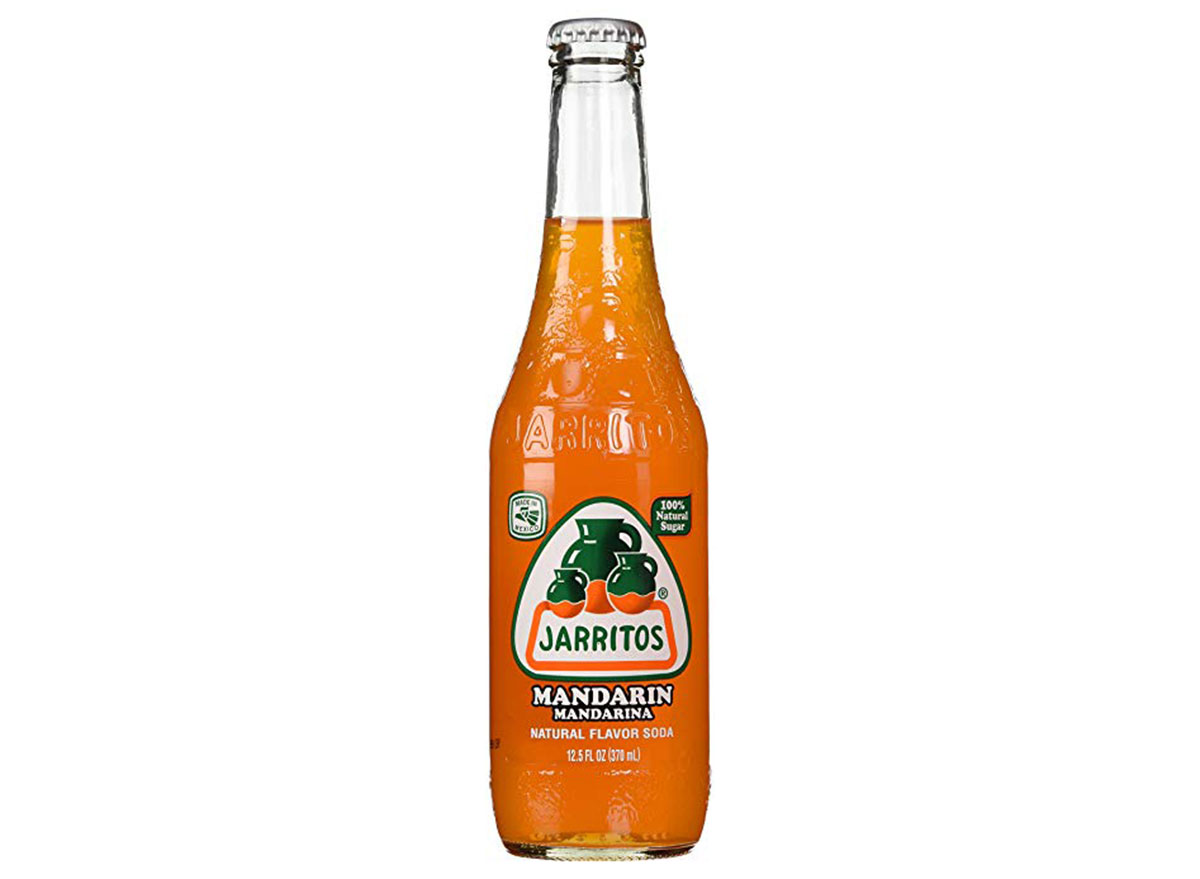
READ RELATED: Who is Juan Vicente Perez? Aged 112, World oldest man alive, Wife, Family, Net worth

Per 1 serving: 120 calories, 0 g fat (0 g saturated fat), 45 mg sodium, 29 g carbs (0 g fiber, 29 g sugar), 0 g protein
This fruit-flavored soda is refreshing, sure, but with 29 grams of sugar in one bottle, it is best reserved for special occasions.
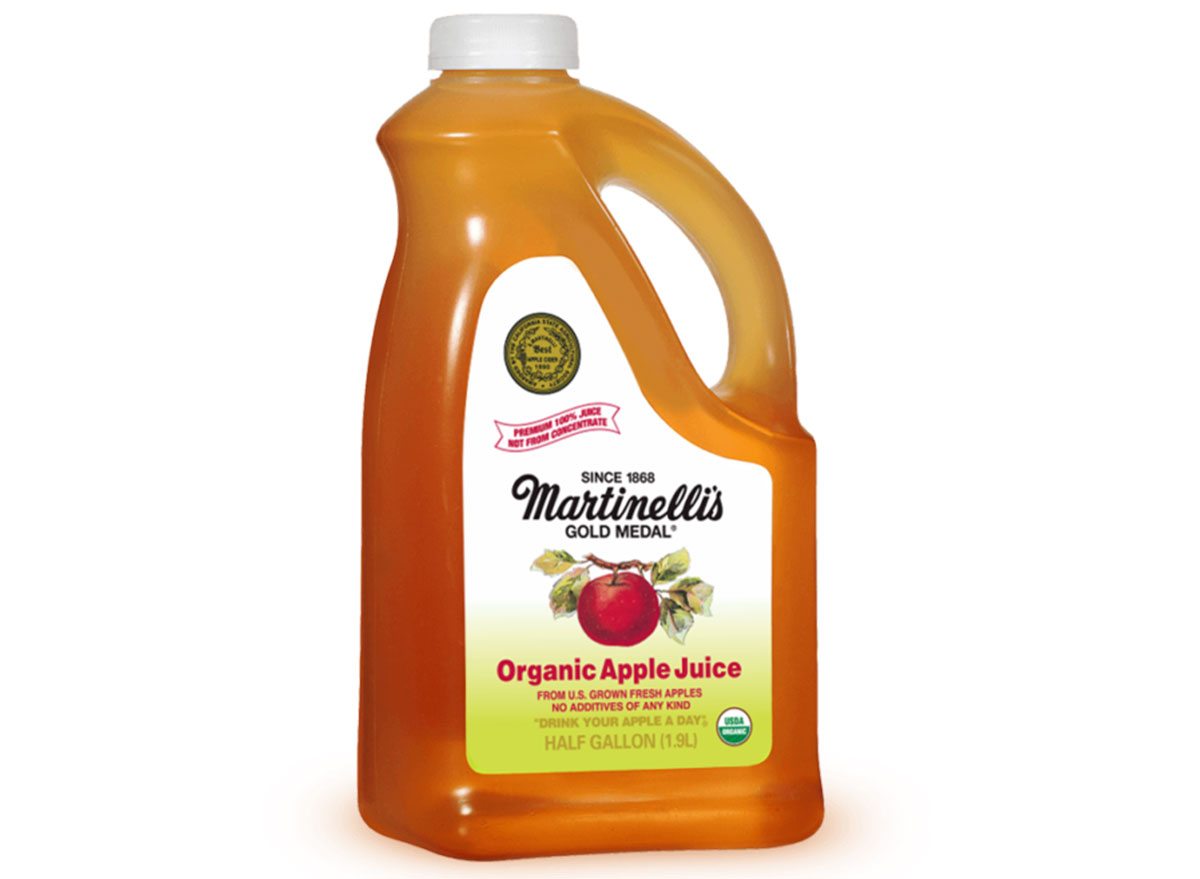

Per 1 serving: 140 calories, 0 g fat (0 g saturated fat), 0 mg sodium, 35 g carbs (0 g fiber, 31 g sugar), 1 g protein
Graham says that with fruit juice, it’s easy to overdrink both your carbohydrates and calories—not to mention the sugar content. “You might be surprised to learn that unsweetened apple juice has even more sugar than regular Coke or Pepsi,” says Graham.
Apple juice can sometimes be a healthy drink option, but this brand’s juice is packed with sugar. Find a lower sugar option if you want to enjoy this refreshing beverage.
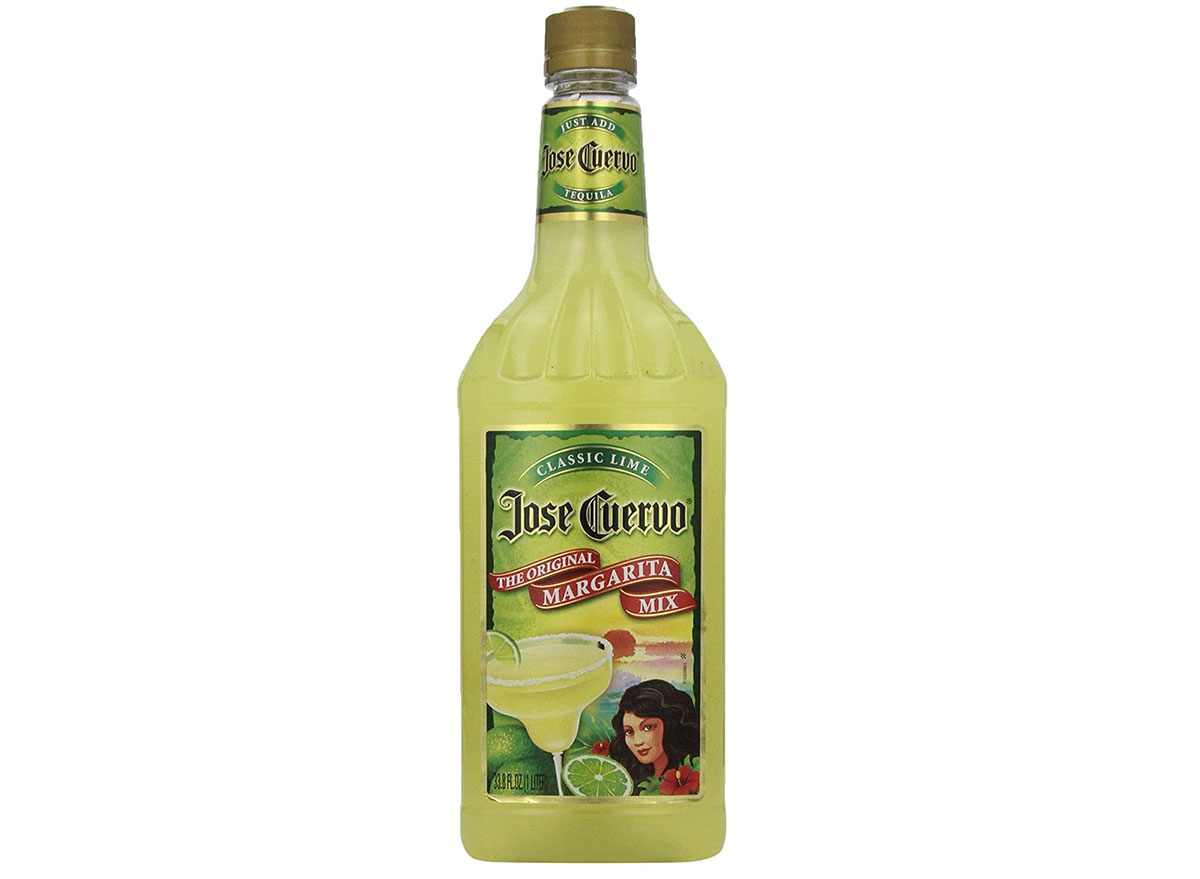

Per 1 serving: 110 calories, 0 g fat (0 g saturated fat), 55 mg sodium, 28 g carbs (0 g fiber, 24 g sugar), 0 g protein
Alcoholic beverages aren’t healthy by nature, but you can certainly enjoy drinks in moderation. Still, if you want a margarita, you are better off making it from scratch. This margarita mix has a lot of added sugar that you can bypass by going the DIY route.
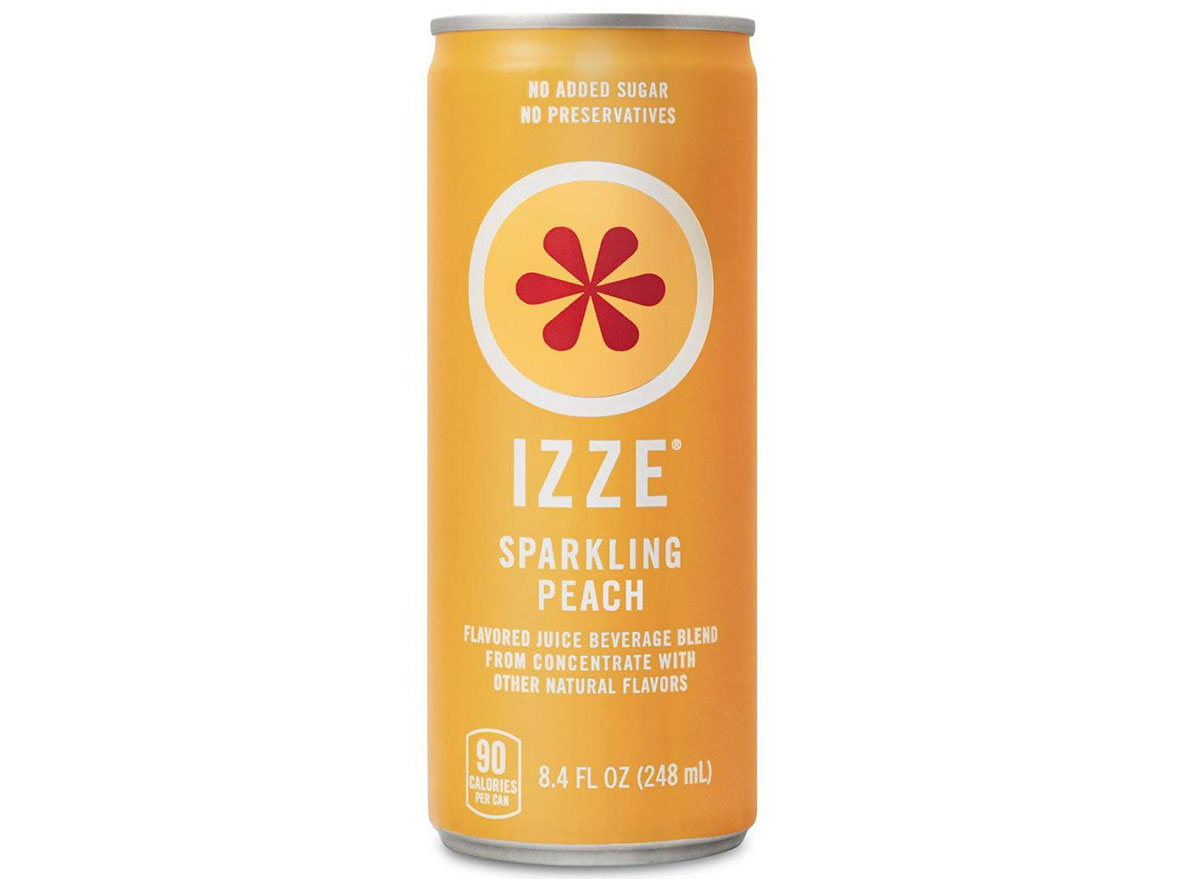

Per 1 can: 90 calories, 0 g fat (0 g saturated fat), 15 mg sodium, 22 g carbs (0 g fiber, 21 g sugar), 0 g protein
Just 8 ounces of this sparkling peach juice has 21 grams of sugar, nearly an entire day’s limit! Mix sparkling water with fresh fruit if you want a similar flavor profile with less sugar.
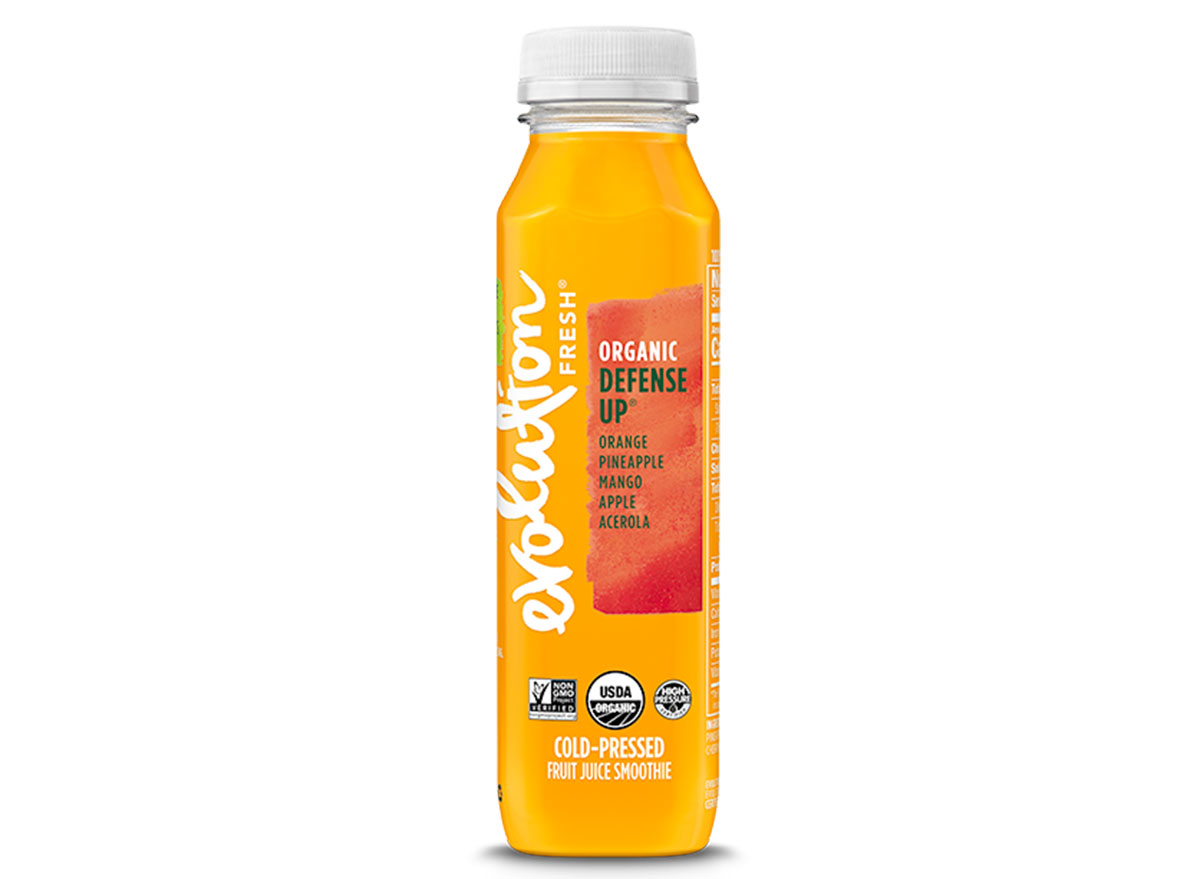

Per 1 bottle: 120 calories, 0 g fat (0 g saturated fat), 0 mg sodium, 30 g carbs (0 g fiber, 27 g sugar), 1 g protein
This Evolution Fresh cold-pressed juice sounds healthy enough, unless you check the nutrition label. The amount of sugar is pretty high; just enjoy whole fruits for the nutritional benefits and delicious flavor.
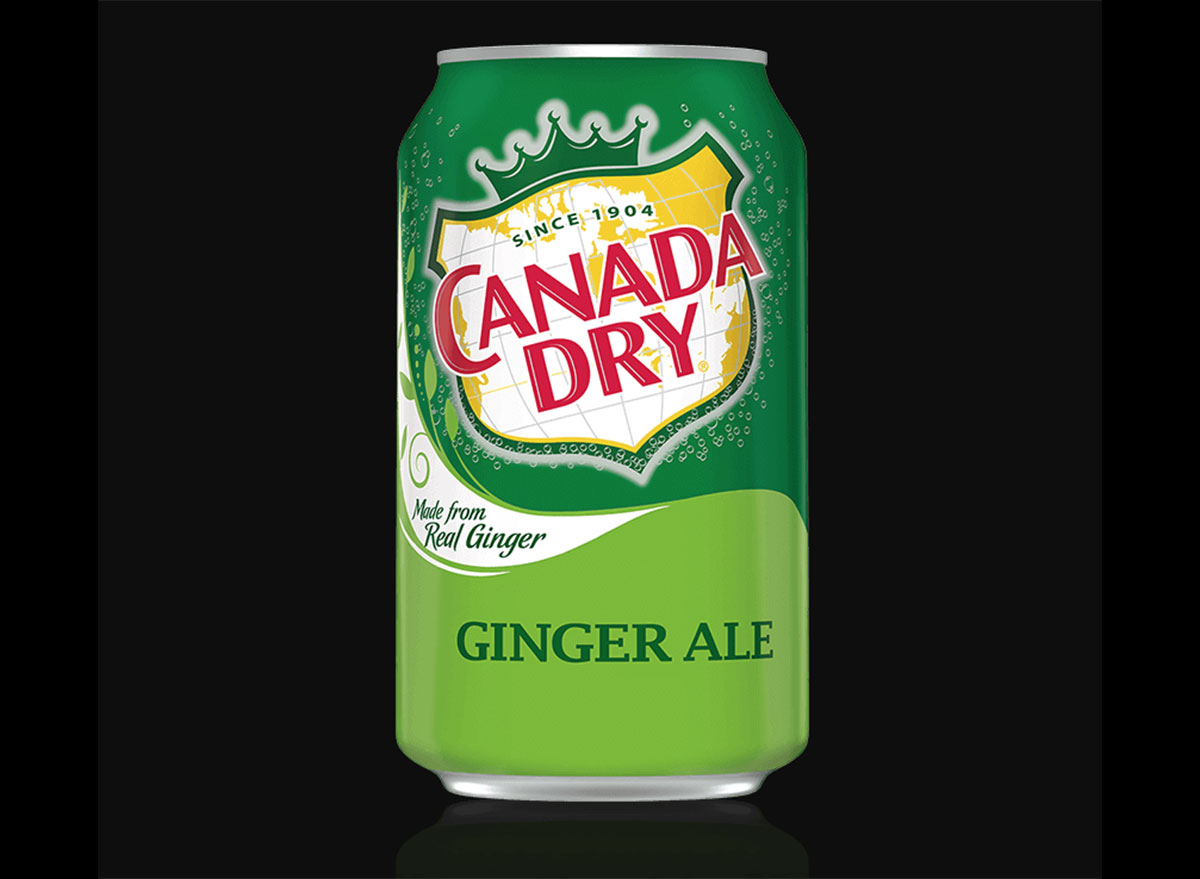

Per 1 can: 140 calories, 0 g fat (0 g saturated fat), 50 mg sodium, 36 g carbs (0 g fiber, 35 g sugar), 0 g protein
Drinking ginger ale is often touted as a way to calm nausea, but don’t go reaching for it the next time you feel ill. It’s the ginger that is bringing on the nutritional benefits, but most likely, you’re not getting a ton of actual ginger in one can of this soda. This Canada Dry ginger ale has a whopping 35 grams of sugar per can, so that tells you what you’re most likely sipping on.
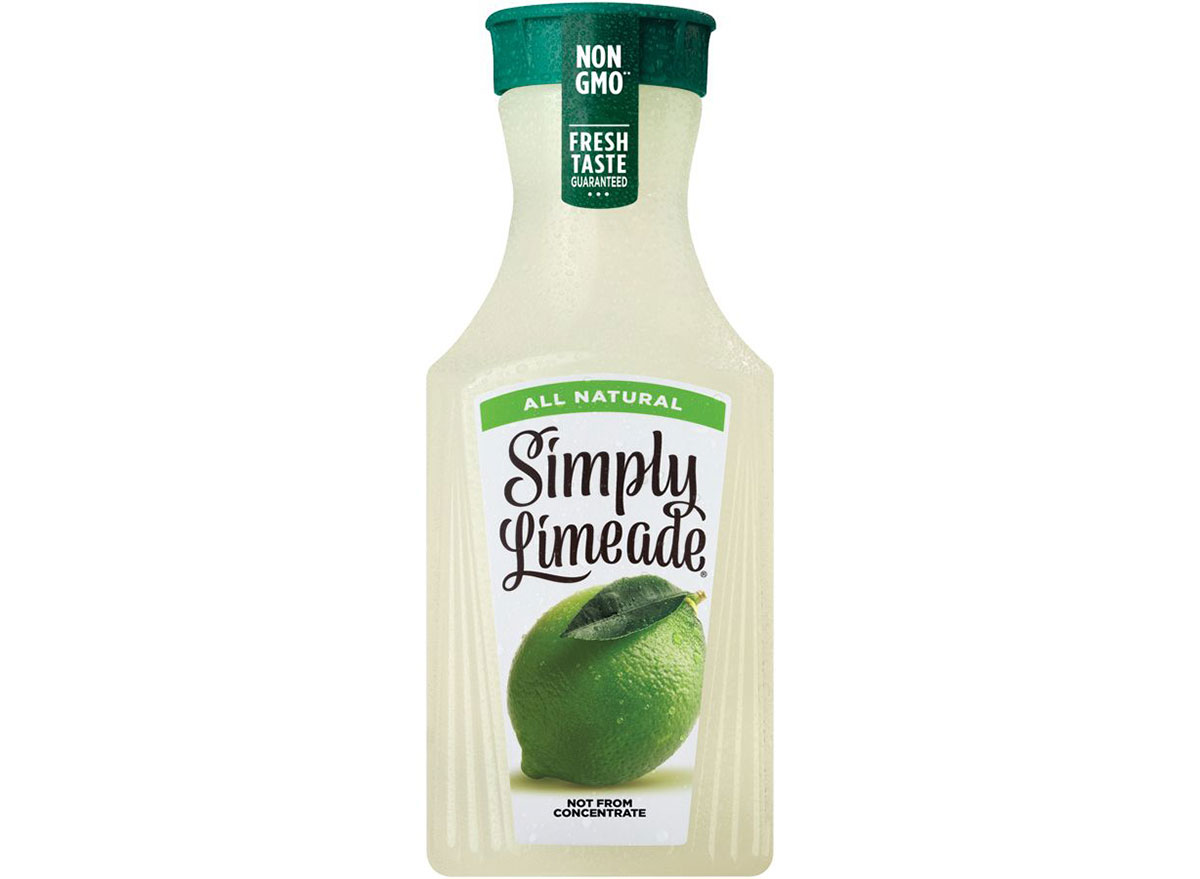

Per 1 serving: 120 calories, 0 g fat (0 g saturated fat), 15 mg sodium, 31 g carbs (0 g fiber, 28 g sugar), 0 g protein
Limeade can be a light, refreshing drink, but instead of gulping down 28 grams of sugar in a mere 8 ounces, enjoy a tall, ice-cold glass of water with slices of lemons and limes to cool down and hydrate. A simple swap!
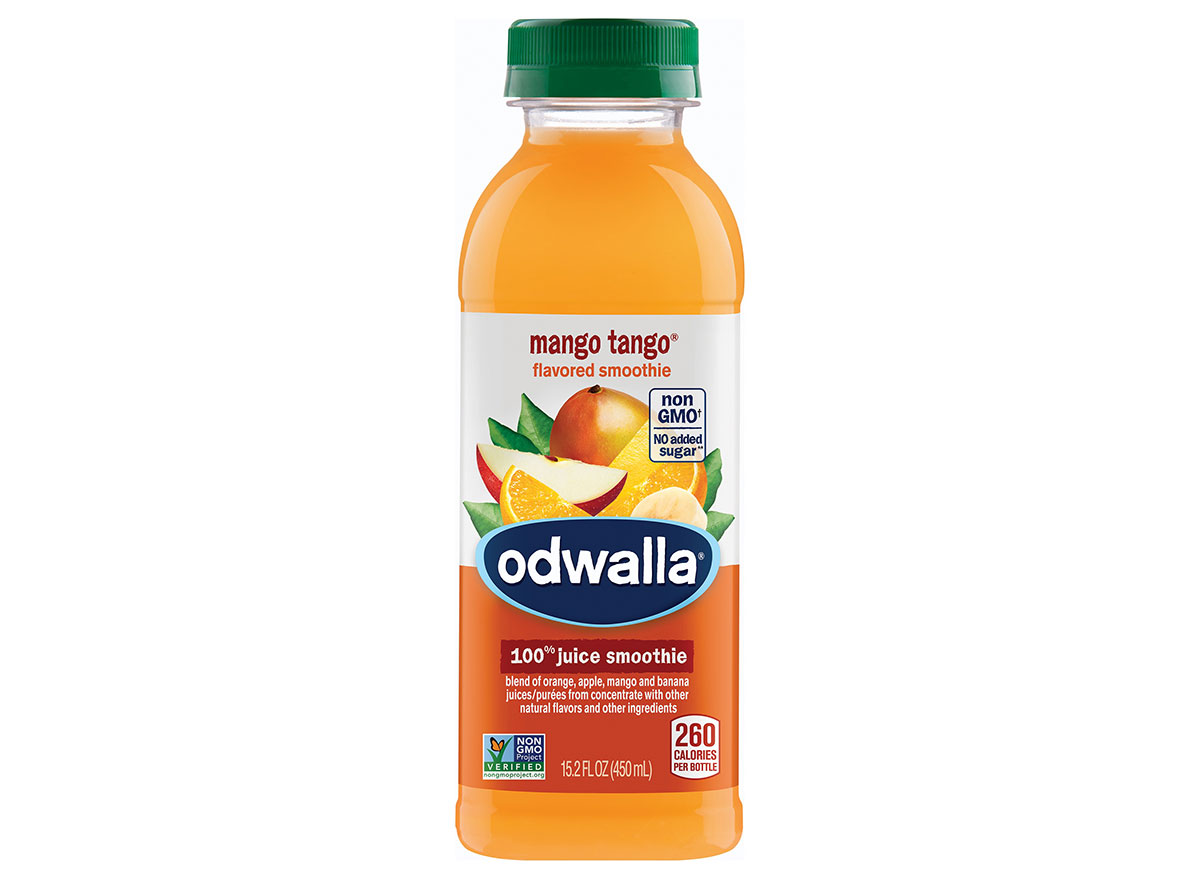

Per 1 bottle: 260 calories, 1.5 g fat (1 g saturated fat), 15 mg sodium, 64 g carbs (3 g fiber, 55 g sugar), 2 g protein
Another bottled smoothie you should stay far away from. Odwalla’s Mango Tango contains a shocking 55 grams of sugar per bottle! Make your own smoothies at home—you can even prep them in advance and store them in the freezer if you love the idea of a grab-and-go option.
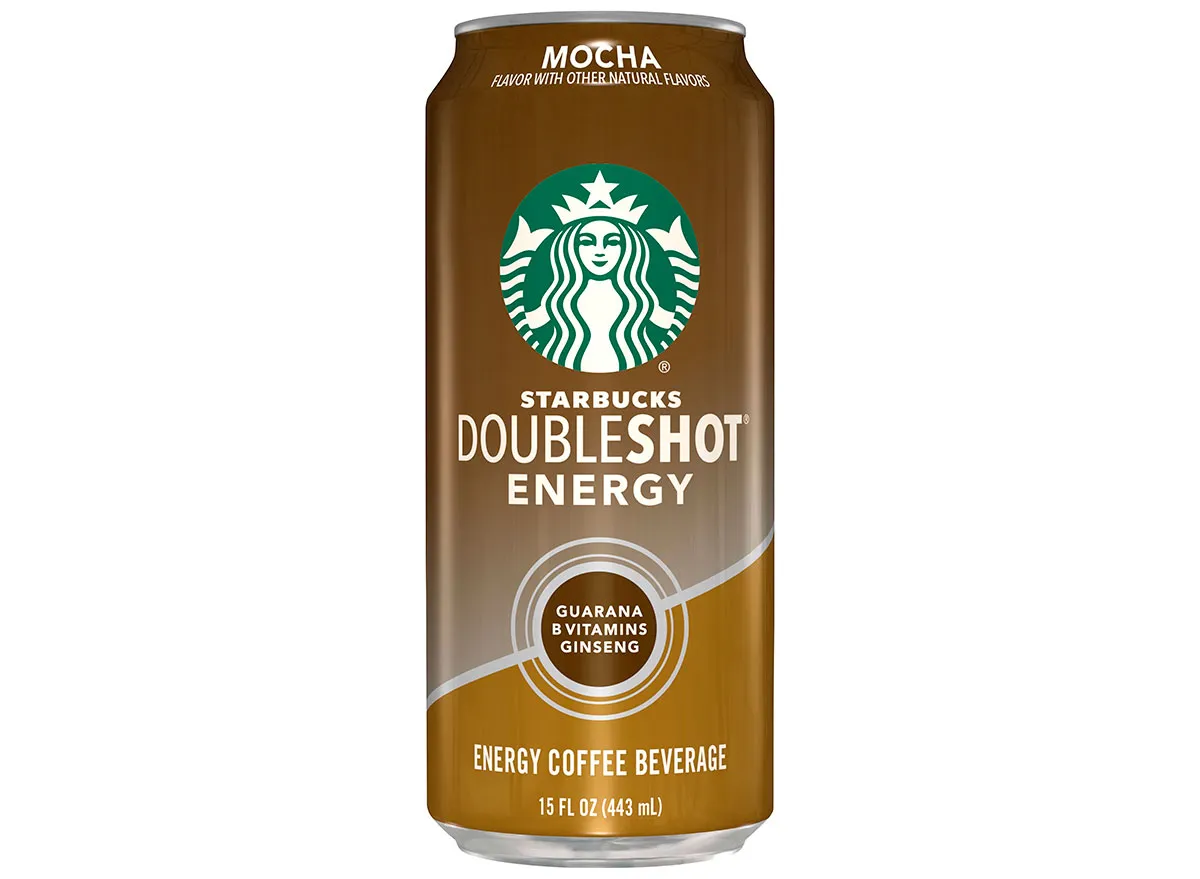

Per 1 can: 200 calories, 2.5 g fat (1.5 g saturated fat), 160 mg sodium, 33 g carbs (0 g fiber, 26 g sugar), 10 g protein
While it doesn’t have quite as much sugar at the bottled Frappuccinos, Starbucks’ DoubleShot energy drinks still aren’t doing you any favors.
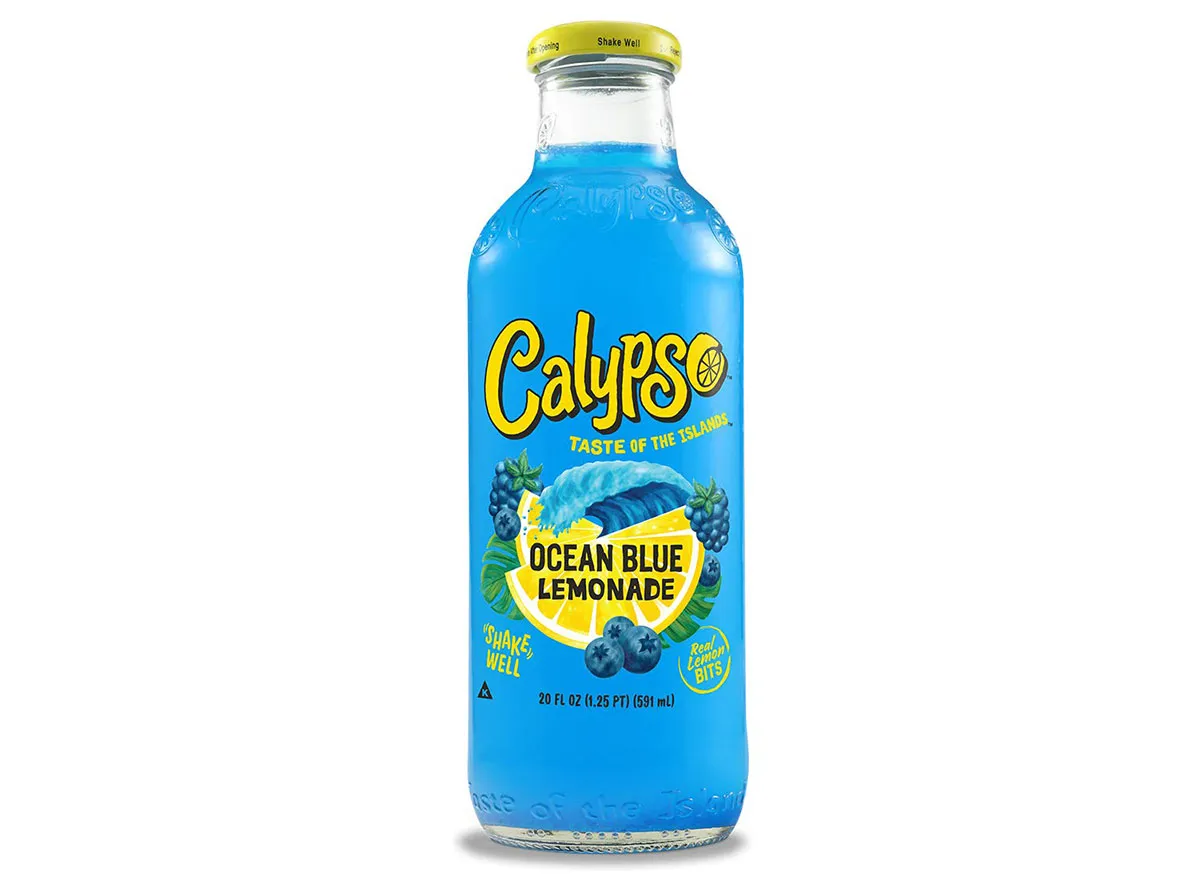

Per 1 serving: 120 calories, 0 g fat (0 g saturated fat), 2 mg sodium, 29 g carbs (0 g fiber, 28 g sugar), 0 g protein
You can probably assume that an electric-blue lemonade isn’t the healthiest drink option, and you’d be right. This lemonade has more than a day’s worth of sugar in just 8 ounces—and who can really drink only 8 ounces of lemonade? You’re likely to consume more, and ultimately drink more sugar.
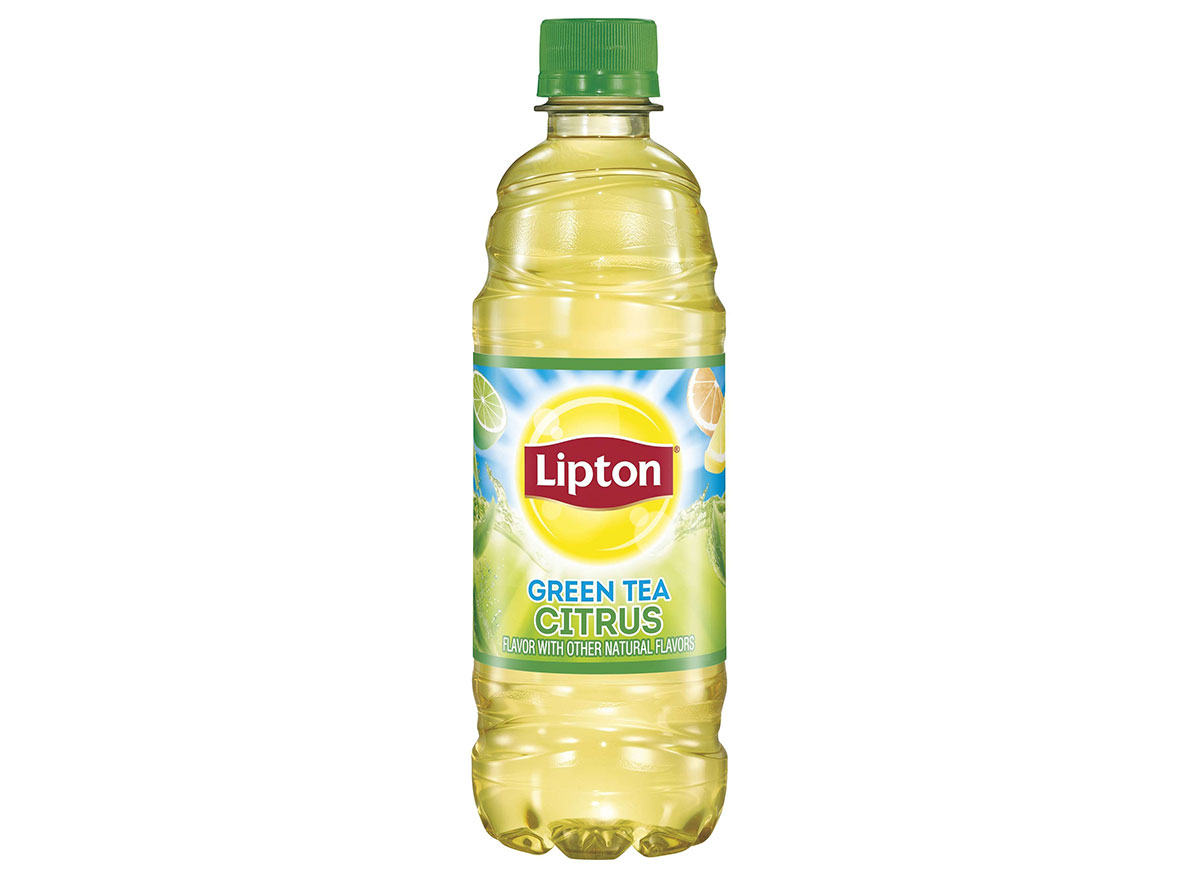

Per 1 bottle: 100 calories, 0 g fat (0 g saturated fat), 105 mg sodium, 28 g carbs (0 g fiber, 27 g sugar), 0 g protein
Although green tea can certainly be a good-for-you beverage and a great afternoon pick-me-up, this Lipton Citrus Green Tea has a lot of sugar to make it sweeter. Enjoy a pitcher of homemade green tea with plenty of fresh citrus slices for a more nutritious version of this drink.
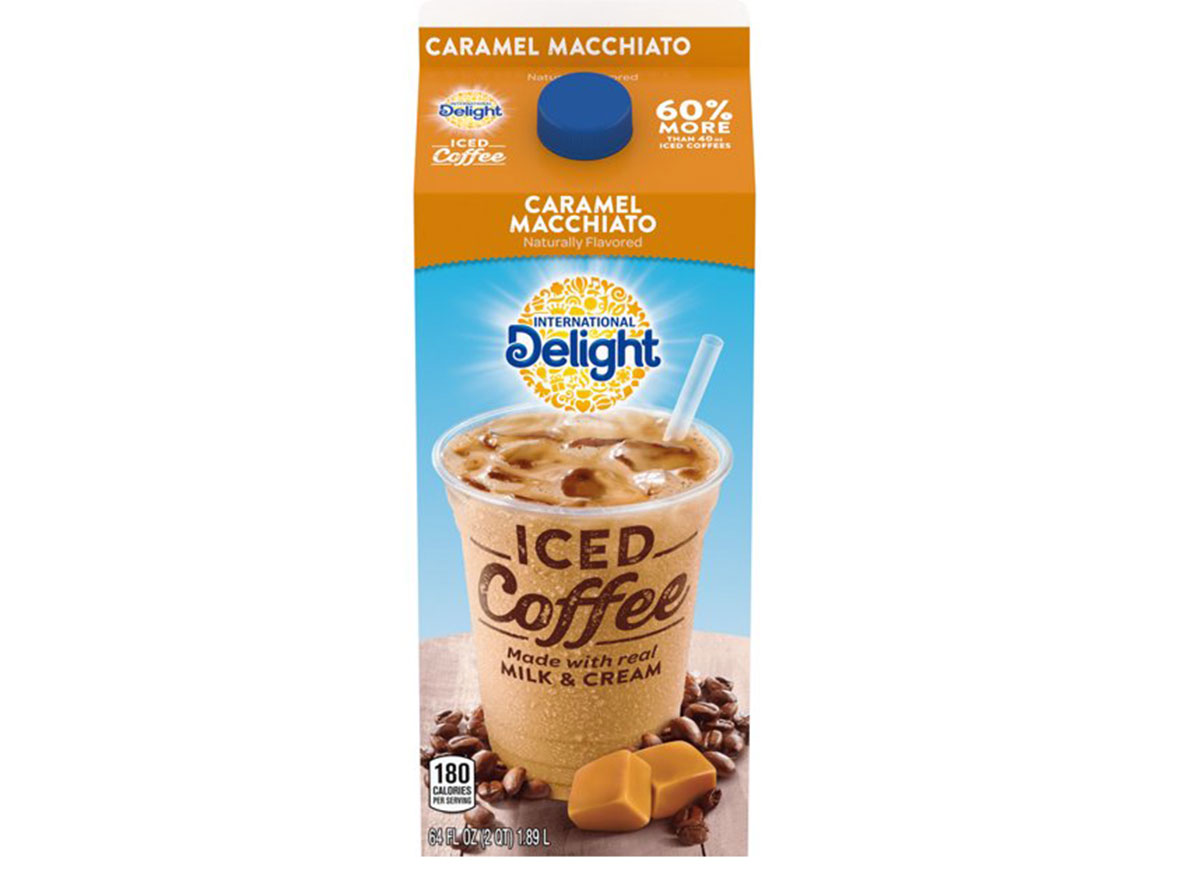

Per 1 serving: 180 calories, 3.5 g fat (2.5 g saturated fat), 120 mg sodium, 32 g carbs (0 g fiber, 29 g sugar), 5 g protein
Anything with caramel is going to have a higher sugar content, and this caramel macchiato-flavored iced coffee is no exception.
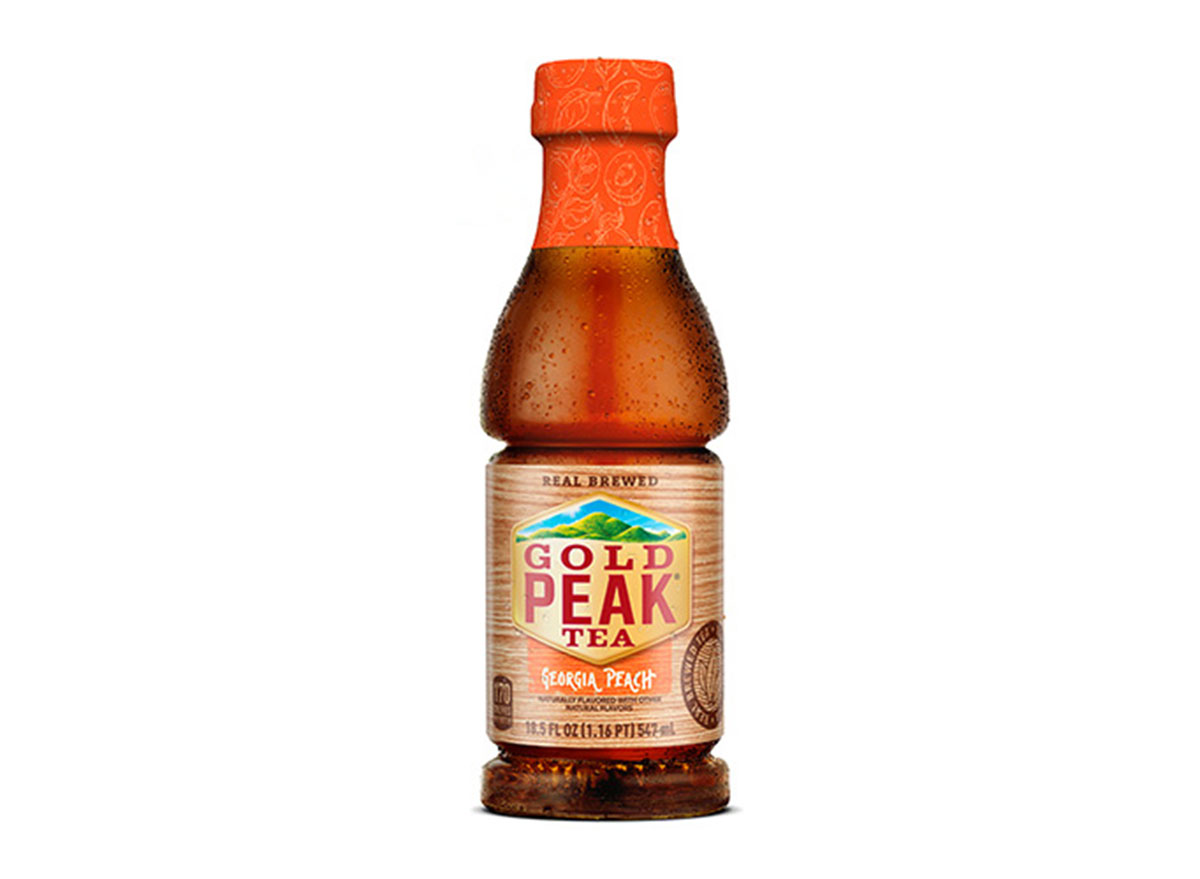

Per 1 bottle: 170 calories, 0 g fat (0 g saturated fat), 30 mg sodium, 45 g carbs (0 g fiber, 45 g sugar), 0 g protein
A bottle of this sweetened, peach-flavored tea has far more grams of sugar than one should consume in a day. This is another great opportunity to make your own version at home!
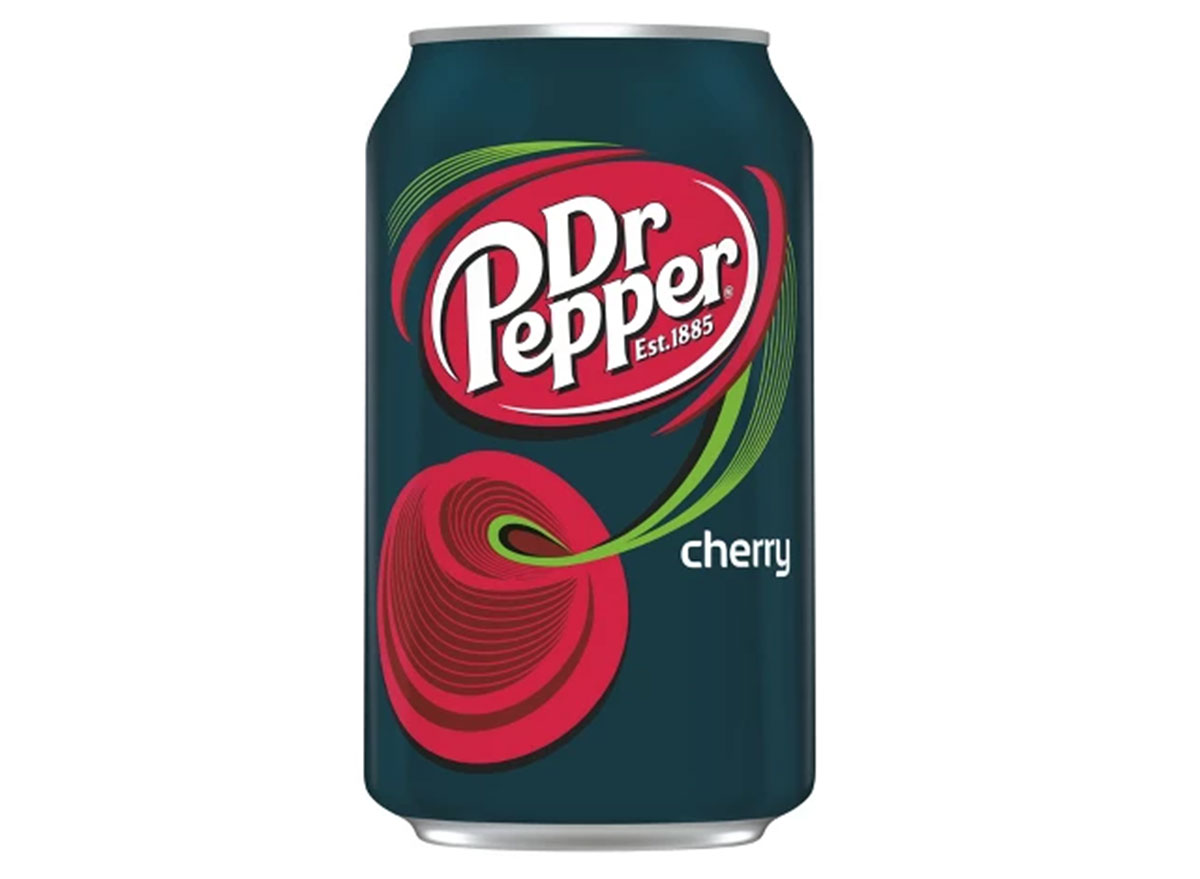

Per 1 can: 160 calories, 0 g fat (0 g saturated fat), 60 mg sodium, 43 g carbs (0 g fiber, 41 g sugar), 0 g protein
Like other pops, Dr Pepper Cherry is best avoided for your health. This has even more sugar than regular Dr Pepper.
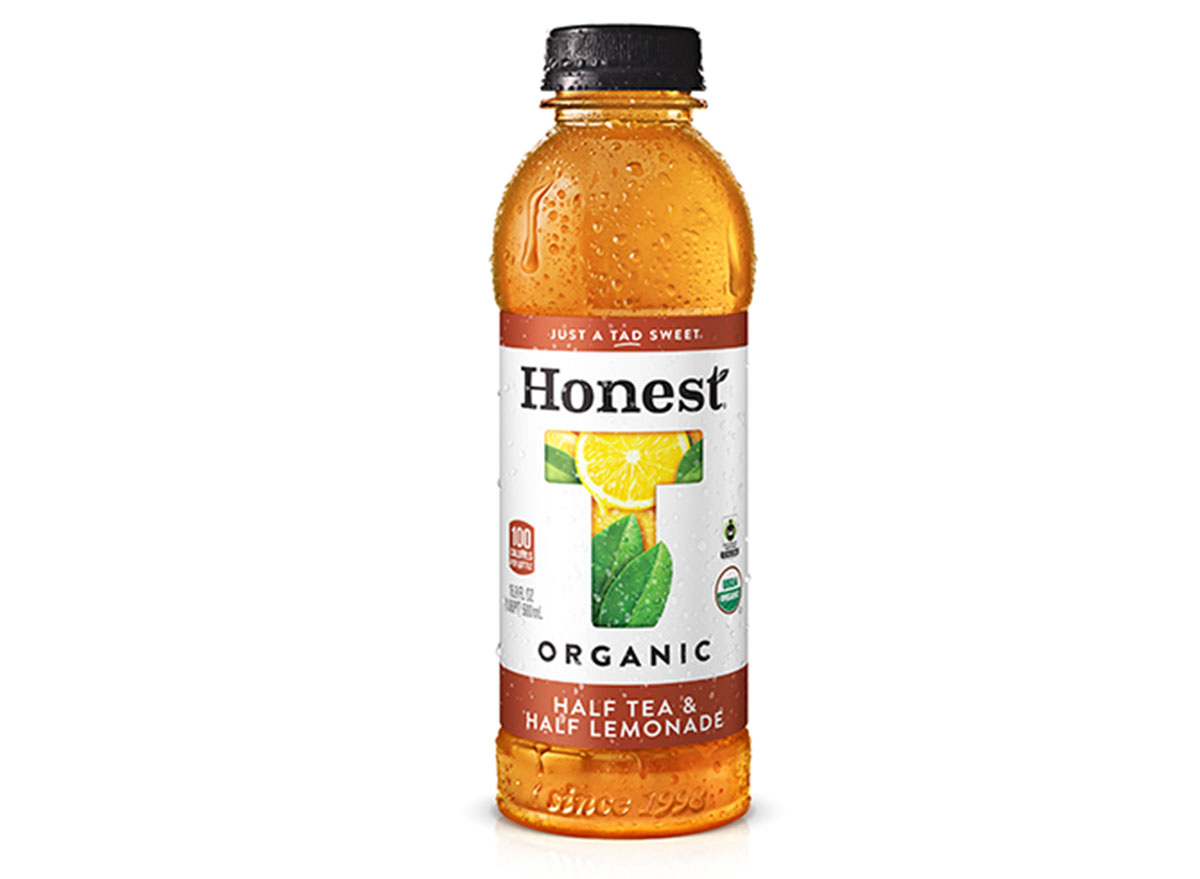

Per 1 bottle: 100 calories, 0 g fat (0 g saturated fat), 0 mg sodium, 25 g carbs (0 g fiber, 25 g sugar), 0 g protein
Sometimes, organic foods and drinks can be confused as being healthy. But a product labeled as certified organic can still be full of sugar, which is the case with this half-tea, half-lemonade drink by Honest Tea.
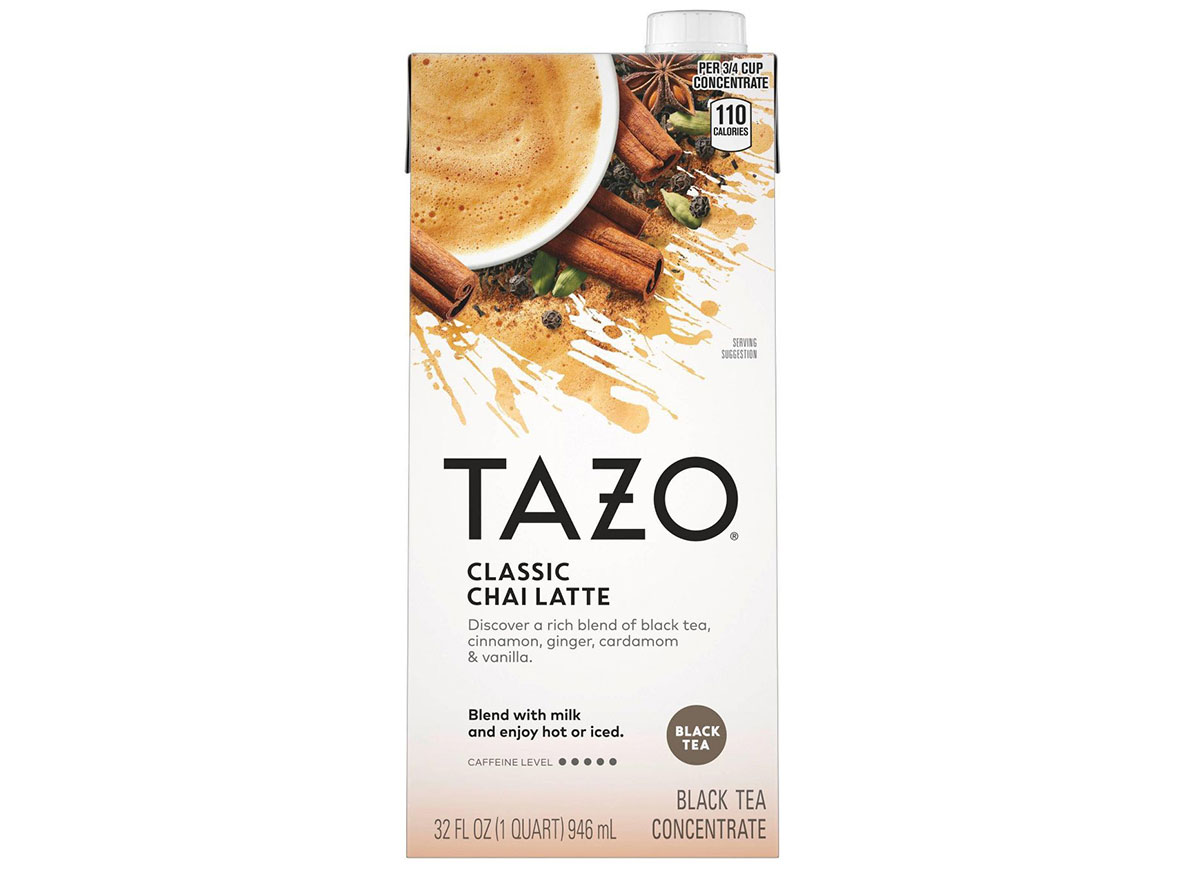

Per 1 serving: 110 calories, 0 g fat (0 g saturated fat), 5 mg sodium, 26 g carbs (2 g fiber, 24 g sugar), 0 g protein
You can easily make a delicious, creamy chai tea latte with less sugar than these premade, shelf-stable versions.
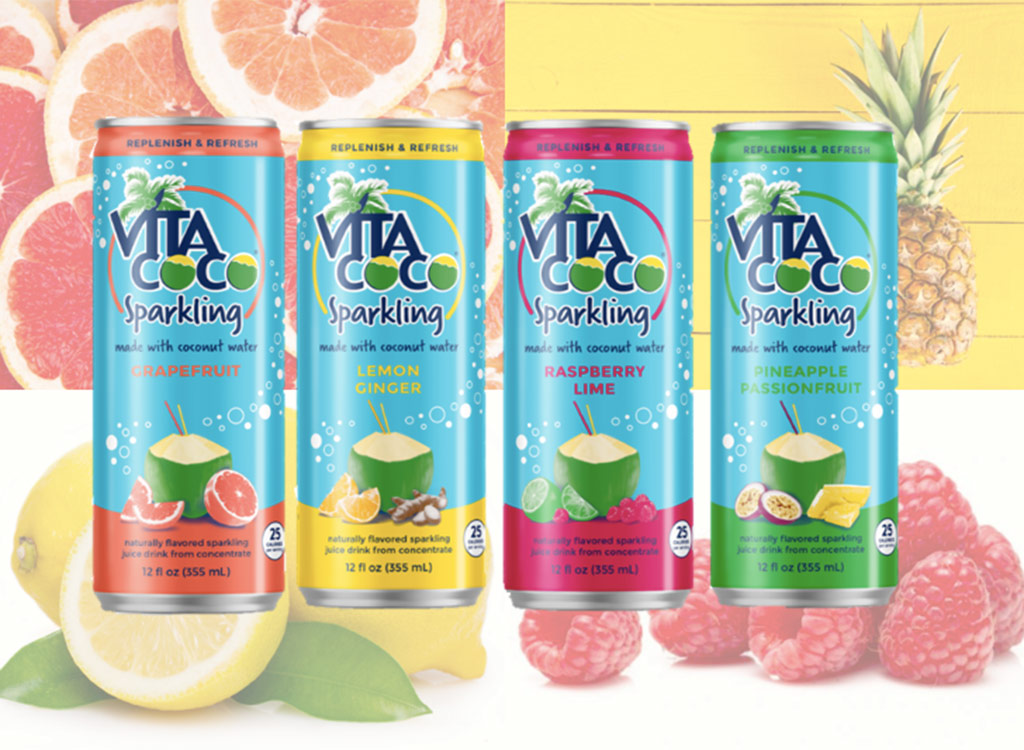

PER 16.9 OUNCE CONTAINER: 120 calories, 0 g fat (0 g saturated fat), 85 mg sodium, 30 g carbs (0 g fiber, 30 g sugar), 0 g protein
Plain coconut water has health benefits because it’s full of electrolytes, which keep your body hydrated throughout the day. However, stay away from the flavored versions like pineapple because they’re packed with sugar. One container of this flavor contains more grams of sugar than you should consume in an entire day.
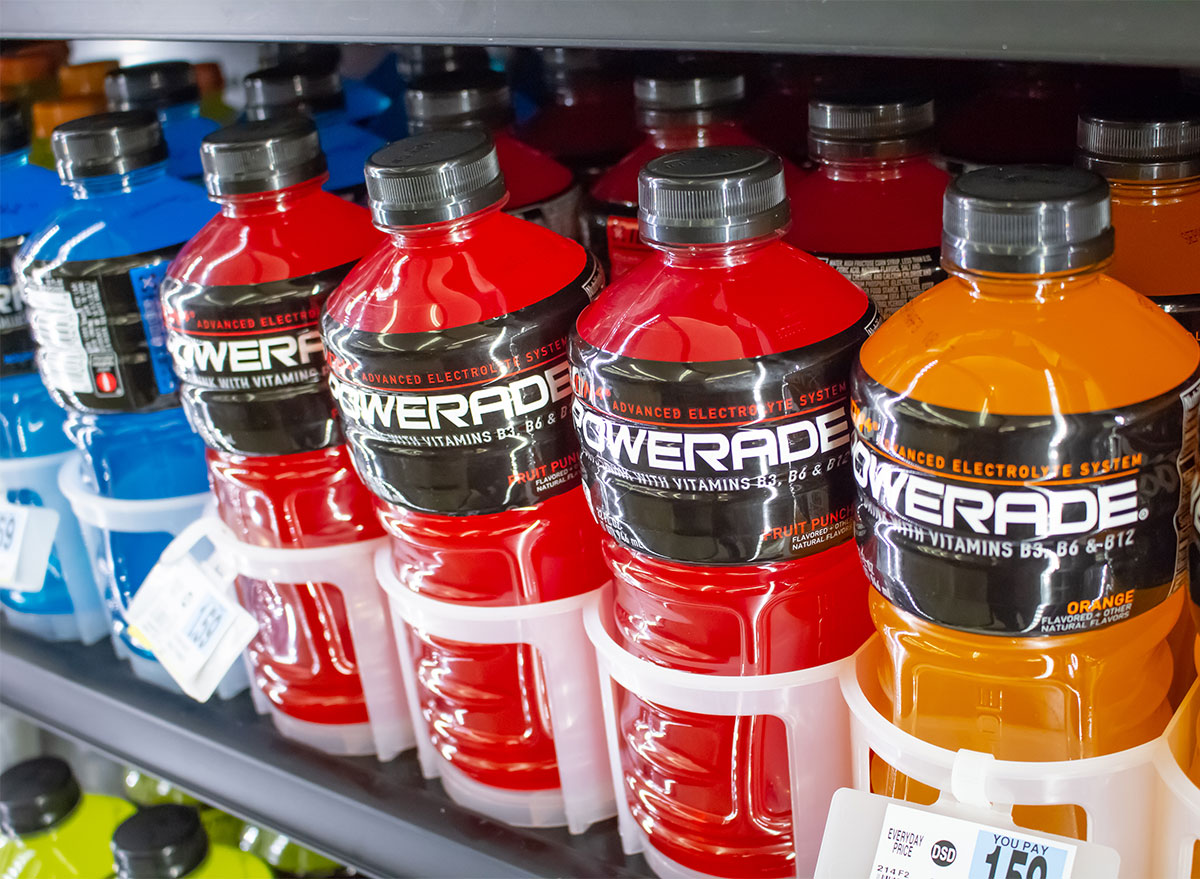

PER 12 OUNCE BOTTLE: 80 calories, 0 g fat (0 g saturated fat), 150 mg sodium, 21 g carbs (0 g fiber, 20 g sugar), 0 g protein
Like Gatorade, Rissetto says that Powerade is good for hydration. However, she recommends leaving it on the grocery store shelf for the same reason as Gatorade—it contains a lot of sugar, which is unhealthy and can cause GI problems for athletes.
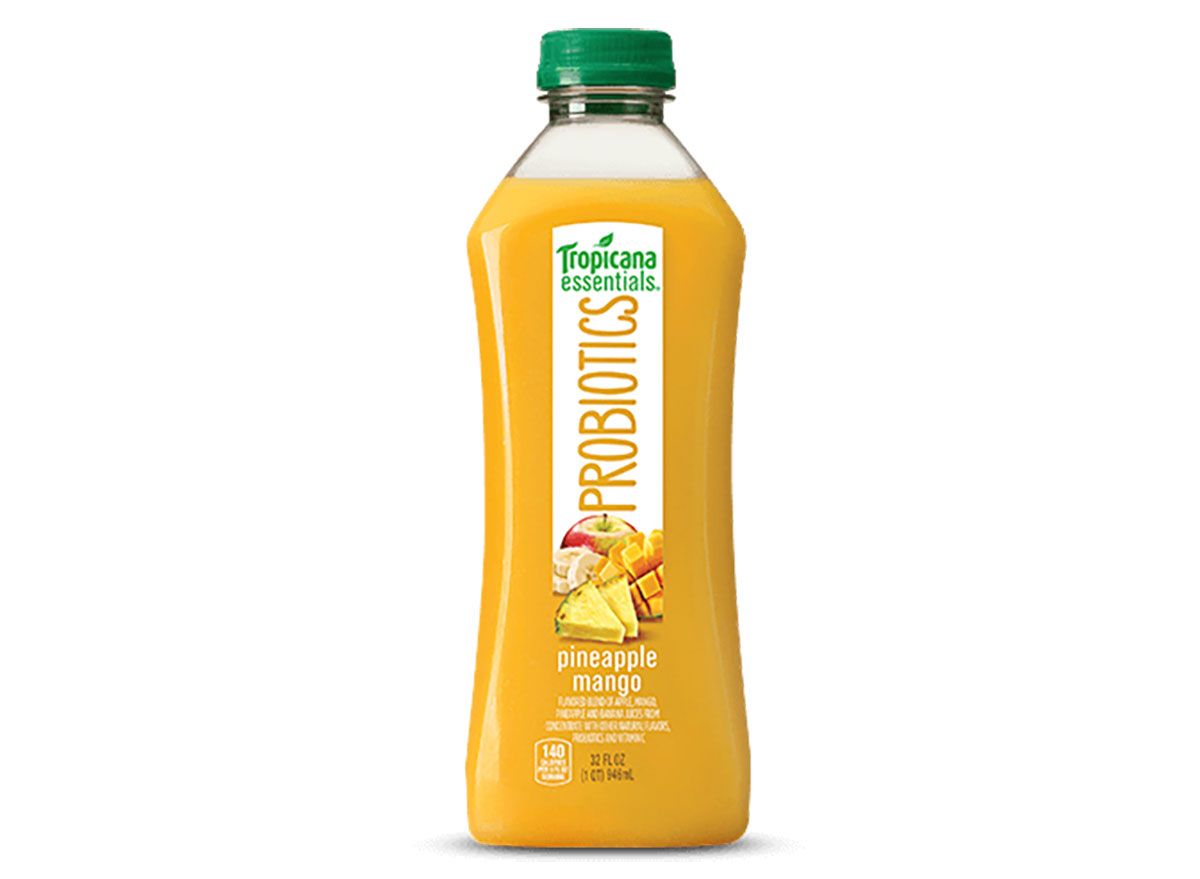

PER 8 OUNCE SERVING: 140 calories, 0 g fat (0 g saturated fat), 10 mg sodium, 33 g carbs (0 g fiber, 29 g sugar), <1 g protein
Probiotics consist of good bacteria that help keep your body healthy and fight off bad bacteria. But although probiotics are good for you, the health benefits are basically canceled out in this drink because it contains a whopping 29 grams of sugar.
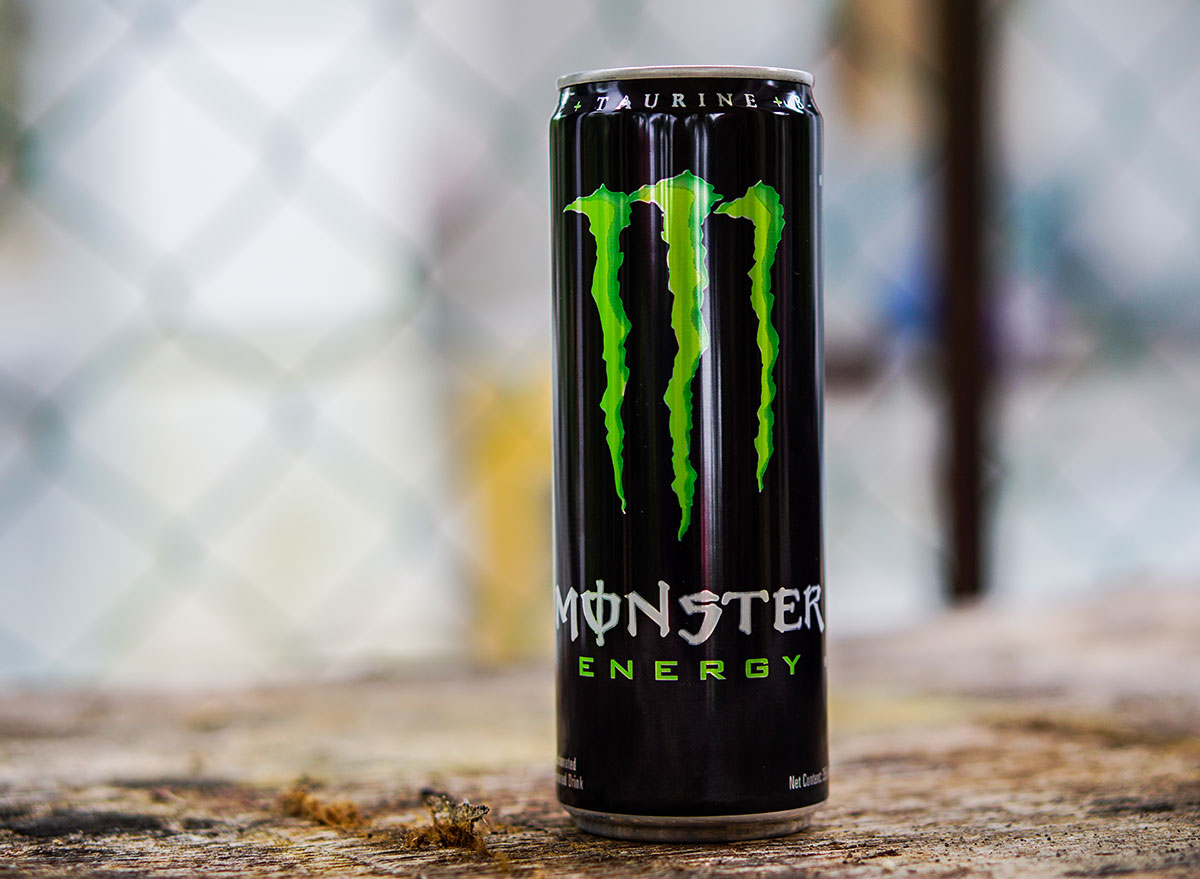

PER 16 OUNCE CAN: 230 calories, 0 g fat (0 g saturated fat), 370 mg sodium, 58 g carbs (0 g fiber, 54 g sugar), 0 g protein
In addition to the staggering amount of sugar in each can, the volume of caffeine is also incredibly high. In fact, with 160 milligrams of caffeine per can, this drink contains more caffeine than Red Bull.
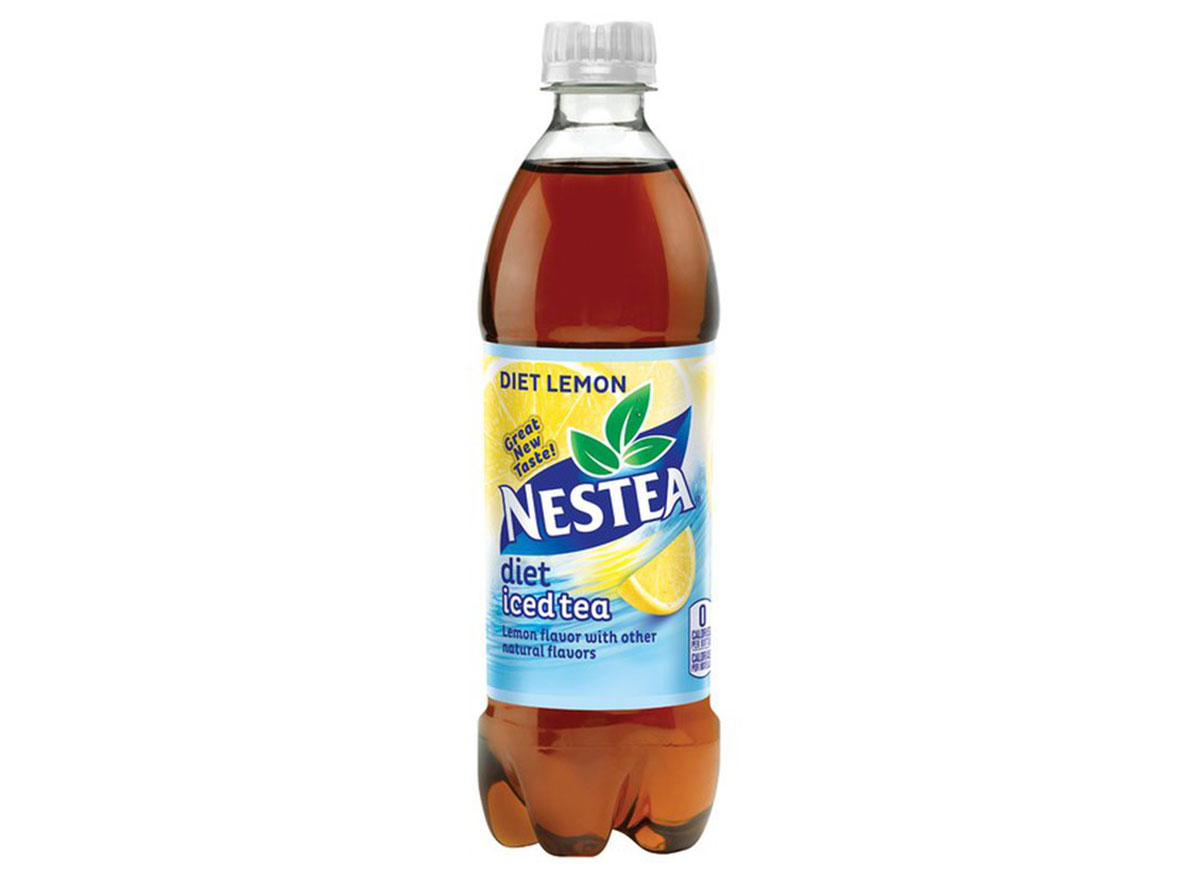

PER 12 OUNCE CAN: 0 calories, 0 g fat (0 g saturated fat), 65 mg sodium, 0 g carbs, 0 g protein
One of the ingredients in this drink is sodium benzoate. Studies have shown that benzoate is located in an area of the DNA that can be damaging to the mitochondria.
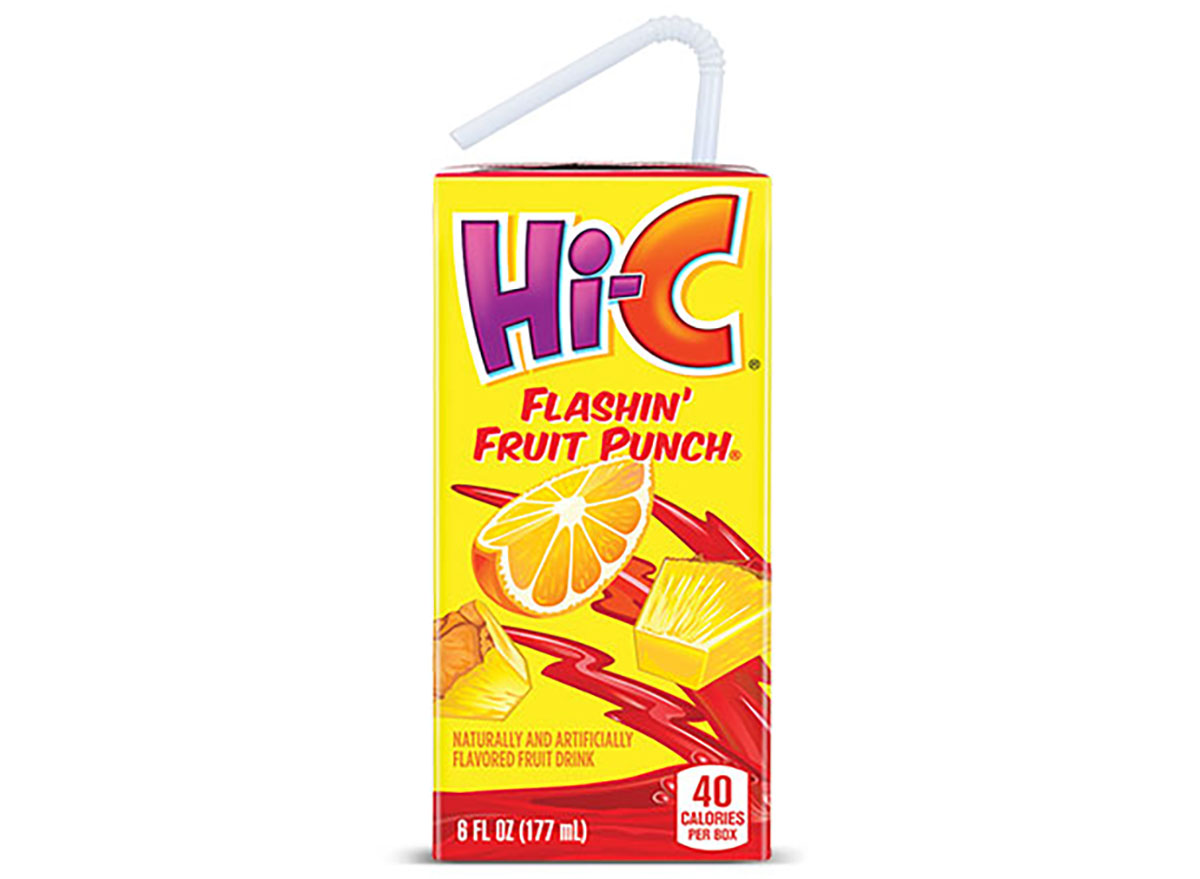

PER 6 OUNCE DRINK BOX: 40 calories, 0 g fat (0 g saturated fat), 15 mg sodium, 11 g carbs (0 g fiber, 10 g sugar), 0 g protein
Like Sunny Delight, Hi-C is another juice blend that contains very little fruit juice. After water, the top ingredient is high fructose corn syrup, an artificial sugar that has been linked to health problems including diabetes and heart disease.
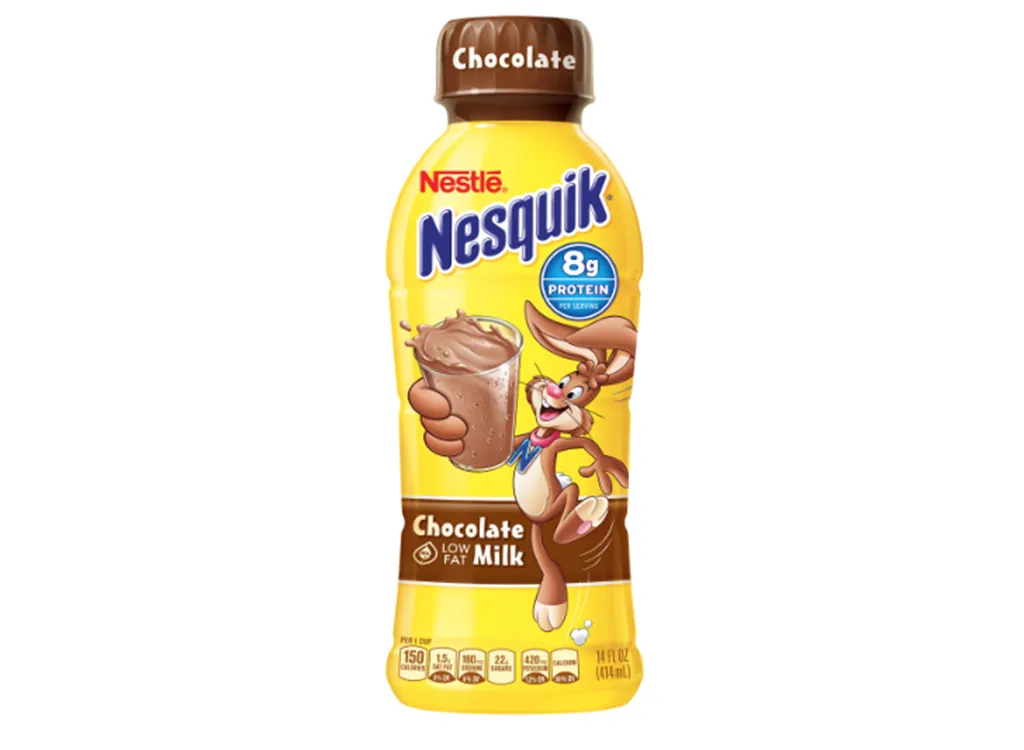

PER 8 OUNCE BOTTLE: 140 calories, 2.5 g fat (1.5 g saturated fat), 130 mg sodium, 24 g carbs (0 g fiber, 21 g sugar), 8 g protein
A mere eight ounces of Nesquik chocolate milk contains 21 grams of sugar—nearly the entire recommended daily amount. Plus, it’s full of artificial flavors. If you love chocolate, find your favorite brand of dark chocolate and keep it on hand for when you’re craving a sweet treat.
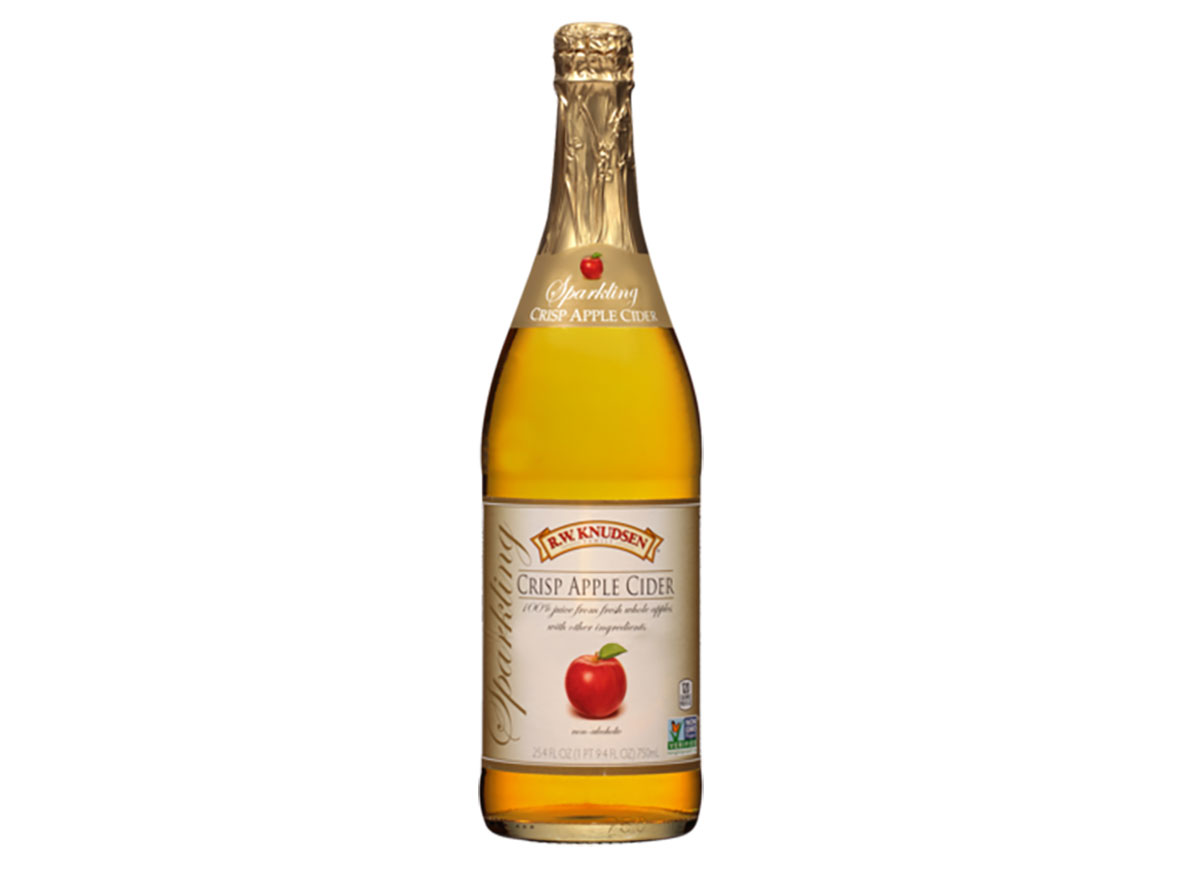

PER 8 OUNCE SERVING: 110 calories, 0 g fat, 10 mg sodium, 28 g carbs (0 g fiber, 24 g sugar), 0 g protein
A popular fall treat is donuts and apple cider. Unfortunately, the average apple cider contains at least 24 grams of sugar, which accounts for the entire recommended daily amount. Get your fix with a few sips, and then switch to an apple.
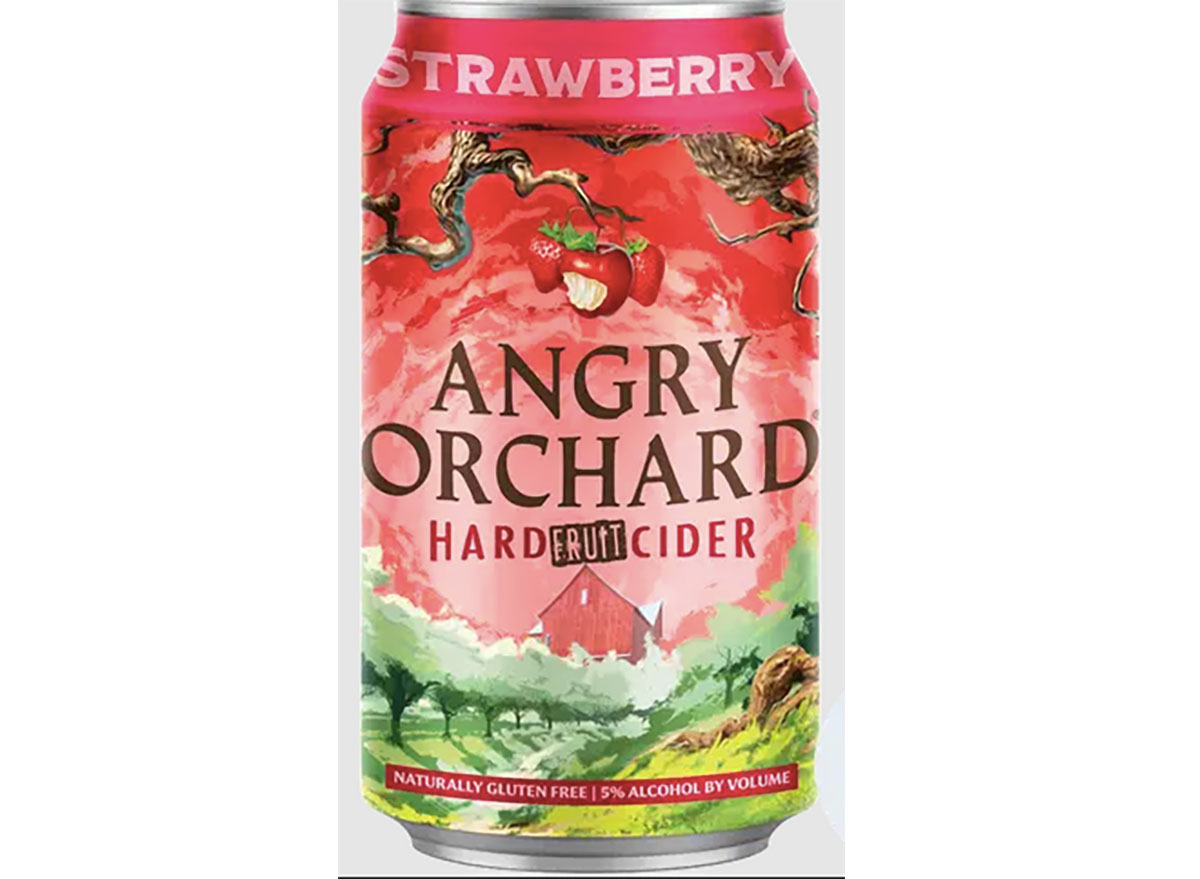

PER 12 OUNCE CAN: 170 calories, 0 g fat, 15 mg sodium, 18 g carbs (0 g fiber, 14 g sugar), 0 g protein
Spiked apple cider is high in both calories and sugar—and we all know how hard it is to stop at just one can. Luckily there’s no shortage of healthy canned alcoholic drinks on grocery store shelves, so you don’t need to miss out—just skip the Angry Orchard.
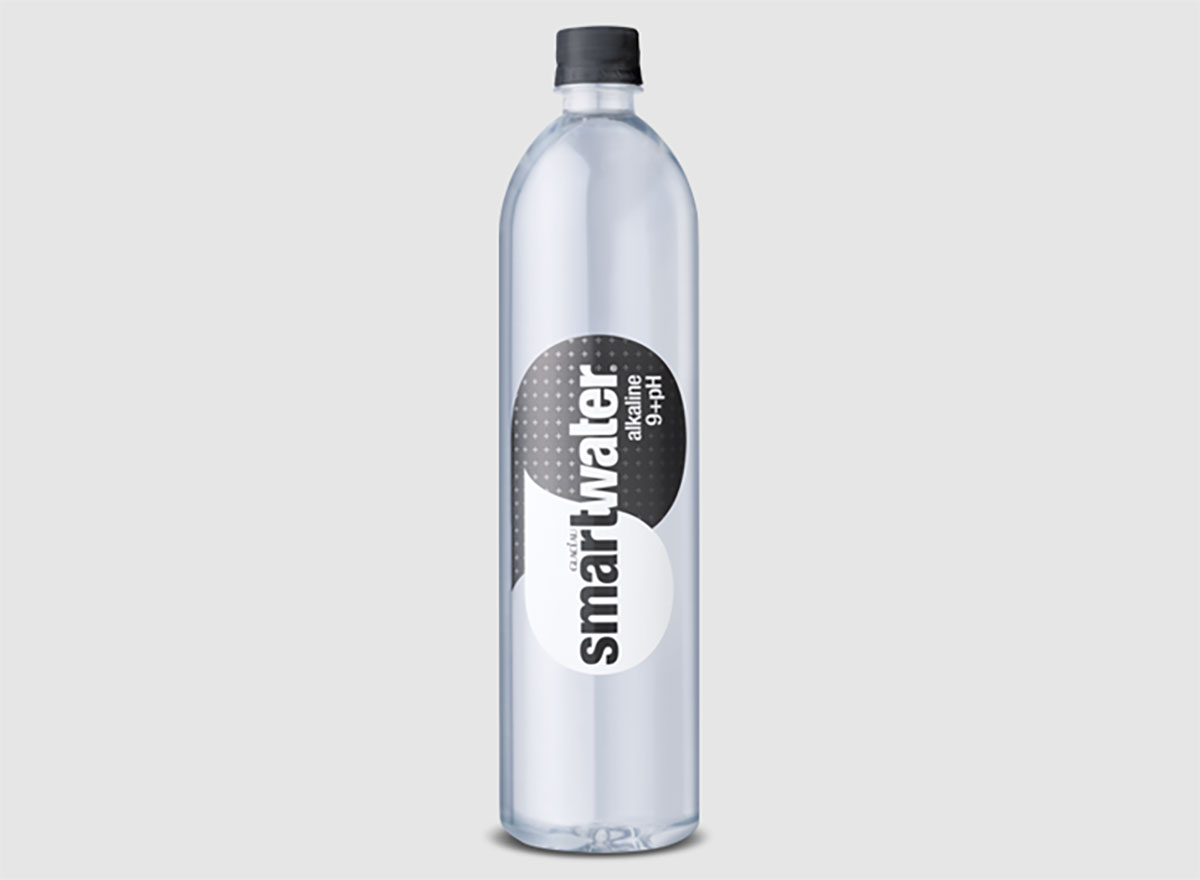

PER 12 OUNCE SERVING: 0 calories, 0 g fat, 0 g carbs, 0 g protein
Although Smartwater’s Alkaline and pH-balanced drinks aren’t bad for you, Rosenbaum recommends saving your money and leaving them on the shelf because they don’t provide any health benefits.
“In general, the body maintains a stable pH through the process of homeostasis,” Rosenbaum says. “Eating a balanced diet will not only support homeostasis but many other functions of the body. [There’s] no need to buy specific water to maintain the body’s pH.”
Source:











